Ibn Humam writes:
It is necessary to punish apostasy with death in order to avert the evil of war, not as punishment for the act of unbelief, because the greatest punishment for that is with Allah.
This punishment is specifically for those who wage war and this is for the man.For this reason, the Prophet prohibited killing women because they do not fight.
Source: Fath ul-Qadeer volume 6 page number 68
Also in the hanafi madhab women old people people who can’t fight children aren’t killed according to al-hawi al-kabir
Hadith like Sahih al-bukhari 1883 Sunan an-nasa’i 4048 prove our point
Imam al-buti rh said if he doesn’t fight us we don’t kill him in his book al-jihad
Page number 212 where he defines to cases of apostasy the non fighter is treated as a normal kaffir where he isn’t killed also not forced to Islam (2:256)
The prophet never forced anyone to follow his religion like ibn al-Qayim said, al-Shāfī’ī adds some people have believed then disbelieved but the prophet didn’t kill them the prophet never
killed any apostate
So in conclusion if the apostate leaves Islam for himself nothing happens to him but if he wants to cause treason and try to get Muslims out of their religion there he is stopped and asked to
repent for 3 days. For this you can check Qūr’ān 3:72 at last this is also present in your book Deuteronomy 13:6-10 and you can pali for quotes from church fathers about this and if you’re an
atheist you have no moral bases to judge byIbn Humam writes:
It is necessary to punish apostasy with death in order to avert the evil of war, not as punishment for the act of unbelief, because the greatest punishment for that is with Allah. This punishment
is specifically for those who wage war and this is for the man.For this reason, the Prophet prohibited killing women because they do not fight.
Source: Fath ul-Qadeer volume 6 page number 68
Also in the hanafi madhab women old people people who can’t fight children aren’t killed according to al-hawi al-kabir
Hadith like Sahih al-bukhari 1883 Sunan an-nasa’i 4048 prove our point
Imam al-buti rh said if he doesn’t fight us we don’t kill him in his book al-jihad
Page number 212 where he defines to cases of apostasy the non fighter is treated as a normal kaffir where he isn’t killed also not forced to Islam (2:256)
The prophet never forced anyone to follow his religion like ibn al-Qayim said, al-Shāfī’ī adds some people have believed then disbelieved but the prophet didn’t kill them the prophet
never killed any apostate
So in conclusion if the apostate leaves Islam for himself nothing happens to him but if he wants to cause treason and try to get Muslims out of their religion there he is stopped and
asked to repent for 3 days. For this you can check Qūr’ān 3:72 at last this is also present in your book Deuteronomy 13:6-10 and you can pali for quotes from church fathers about this and
if you’re an atheist you have no moral bases to judge by


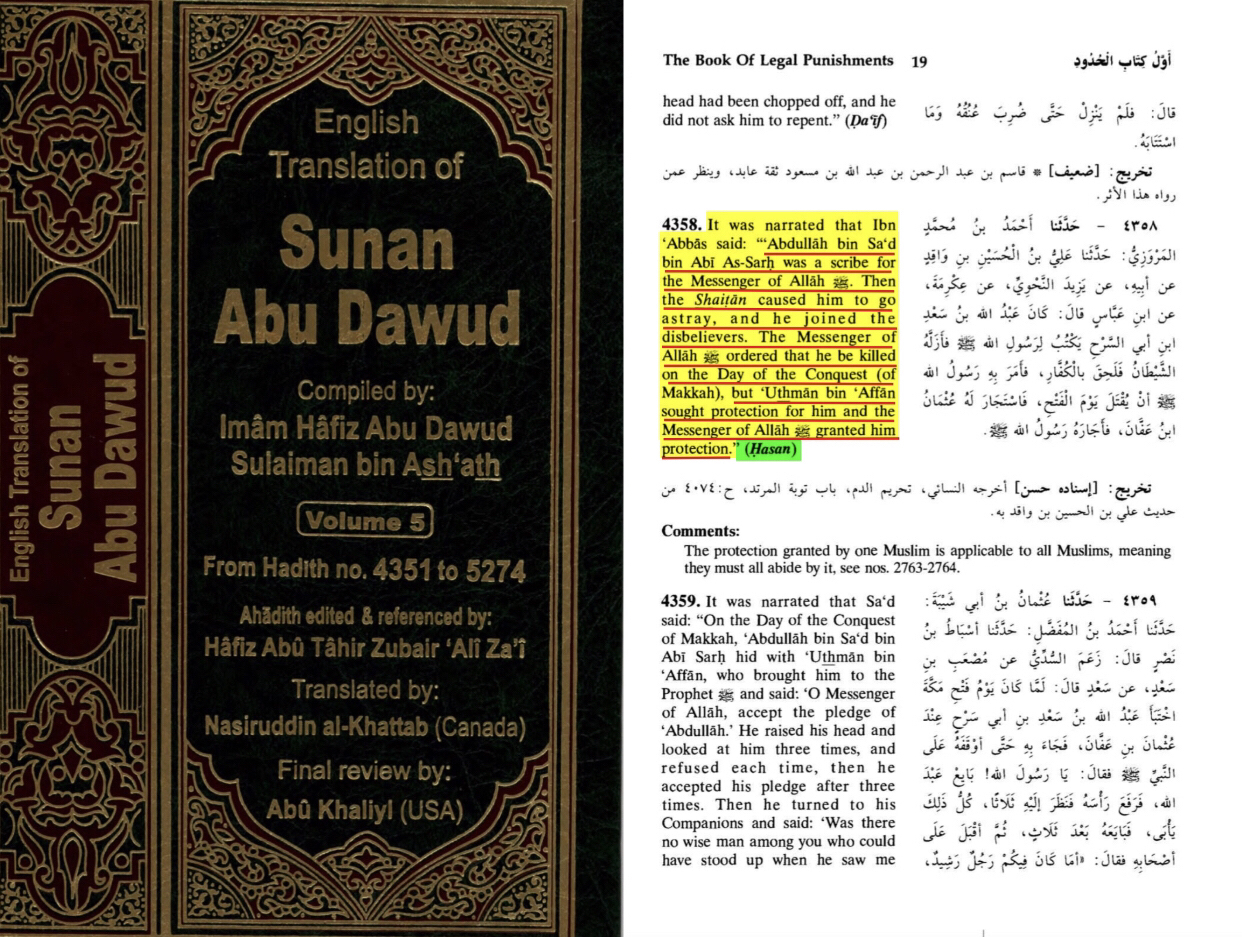
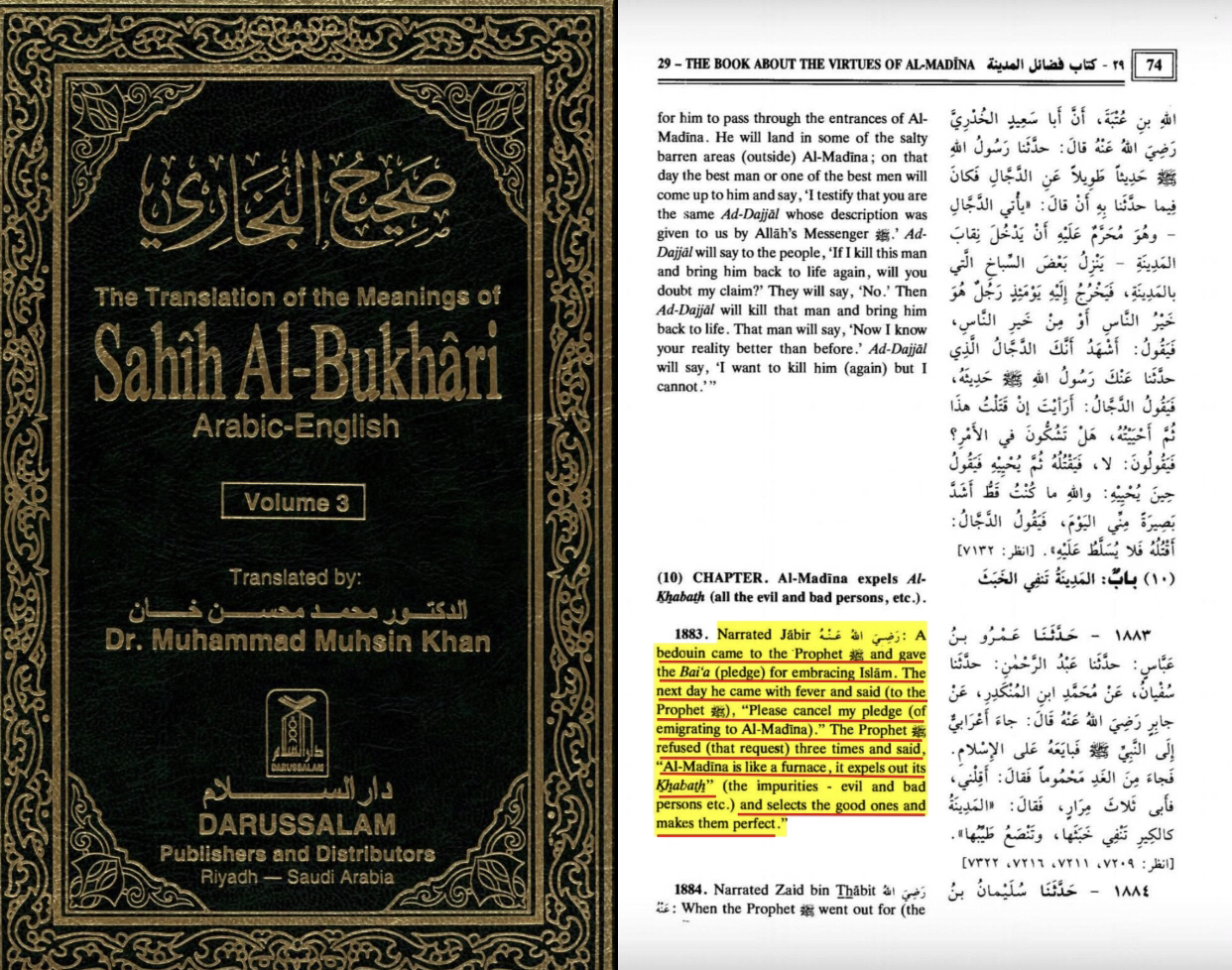





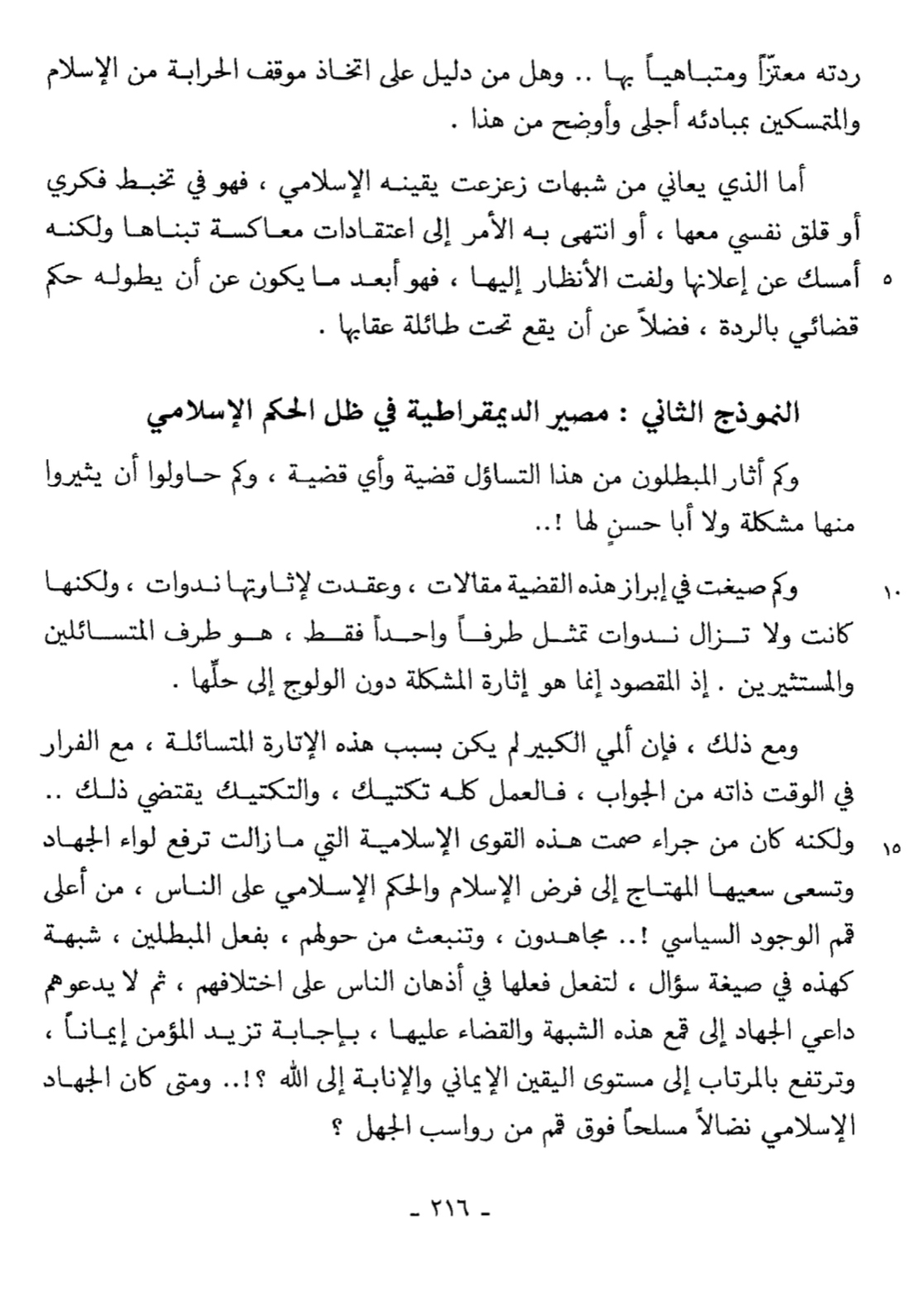
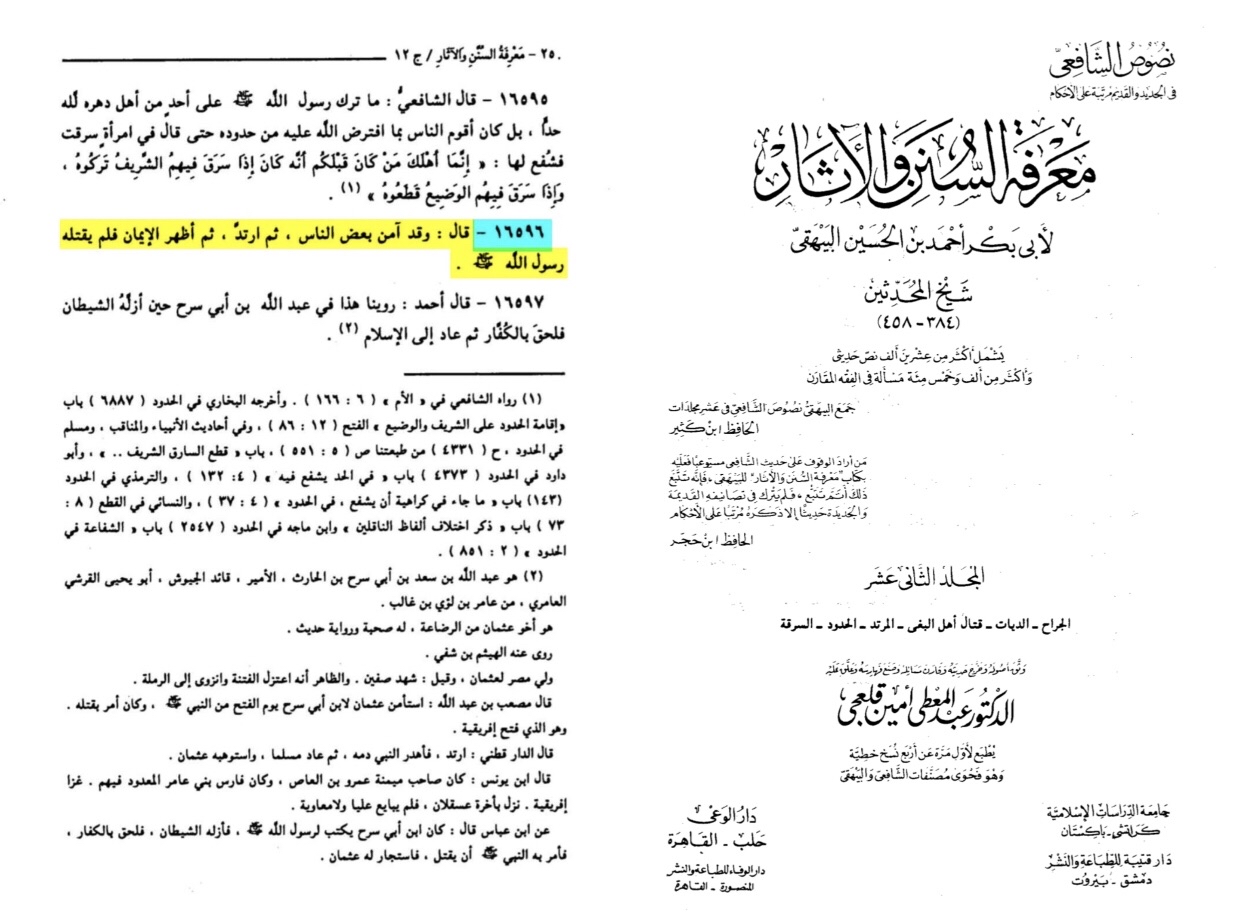
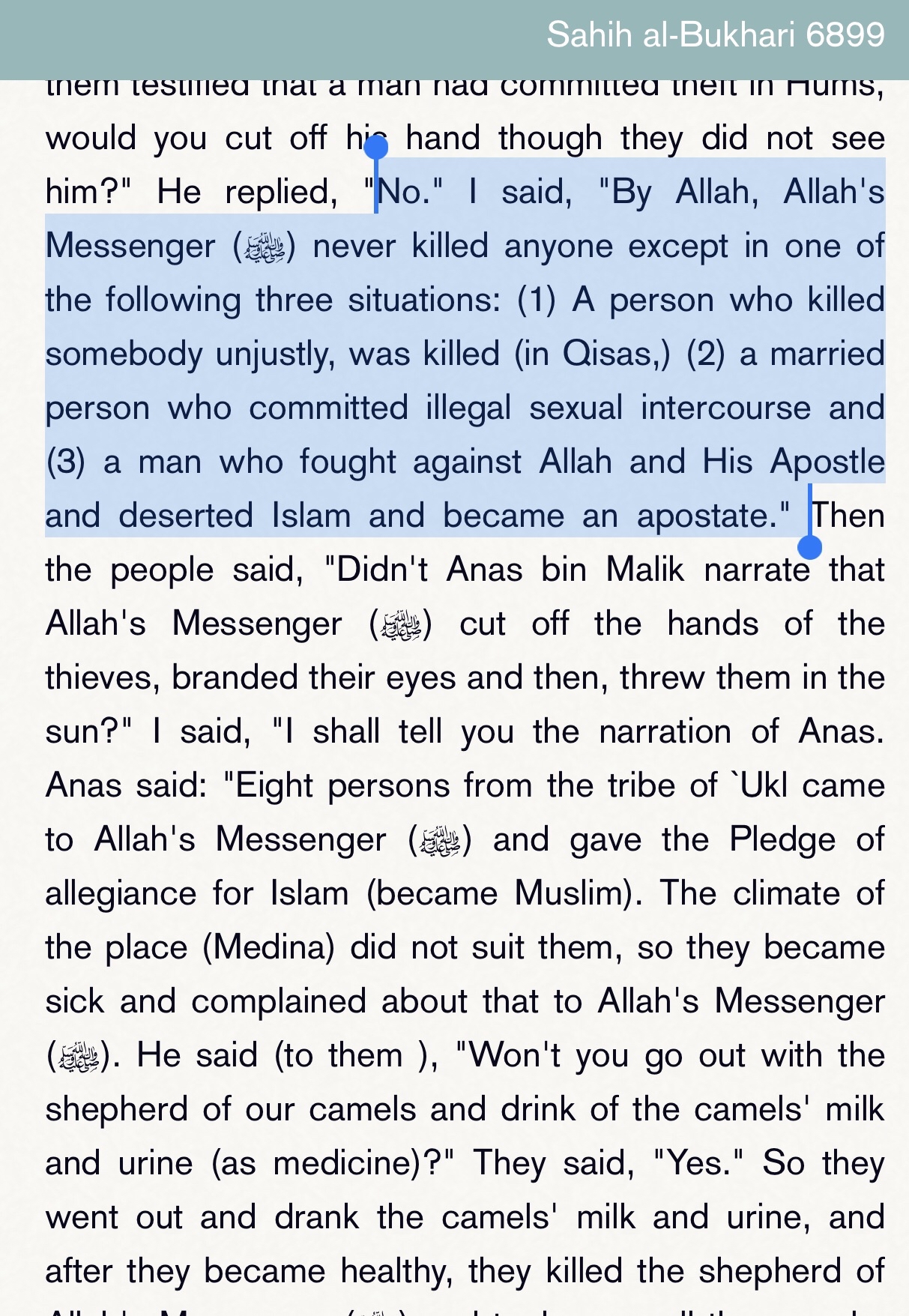
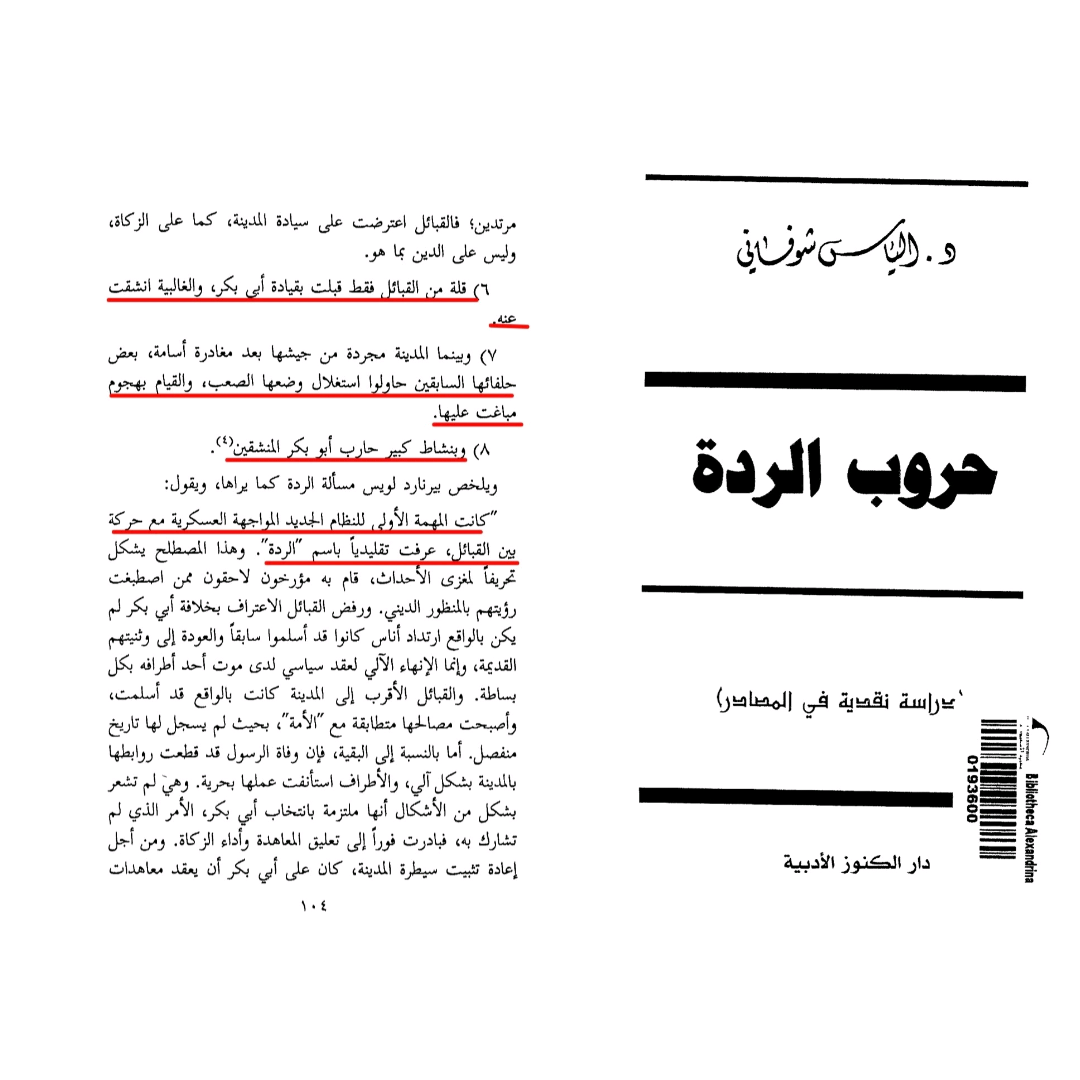 This shows that "apostasy" wasn't merely just leaving Islam and in the apostasy wars, they weren't fighting people who left Islam but those who fought against the ruler
which would be punished in any state. Also there's many people who worshiped God and were Muslims but were considered apostates because they repelled against the ruling government in Medina.
This shows that "apostasy" wasn't merely just leaving Islam and in the apostasy wars, they weren't fighting people who left Islam but those who fought against the ruler
which would be punished in any state. Also there's many people who worshiped God and were Muslims but were considered apostates because they repelled against the ruling government in Medina.
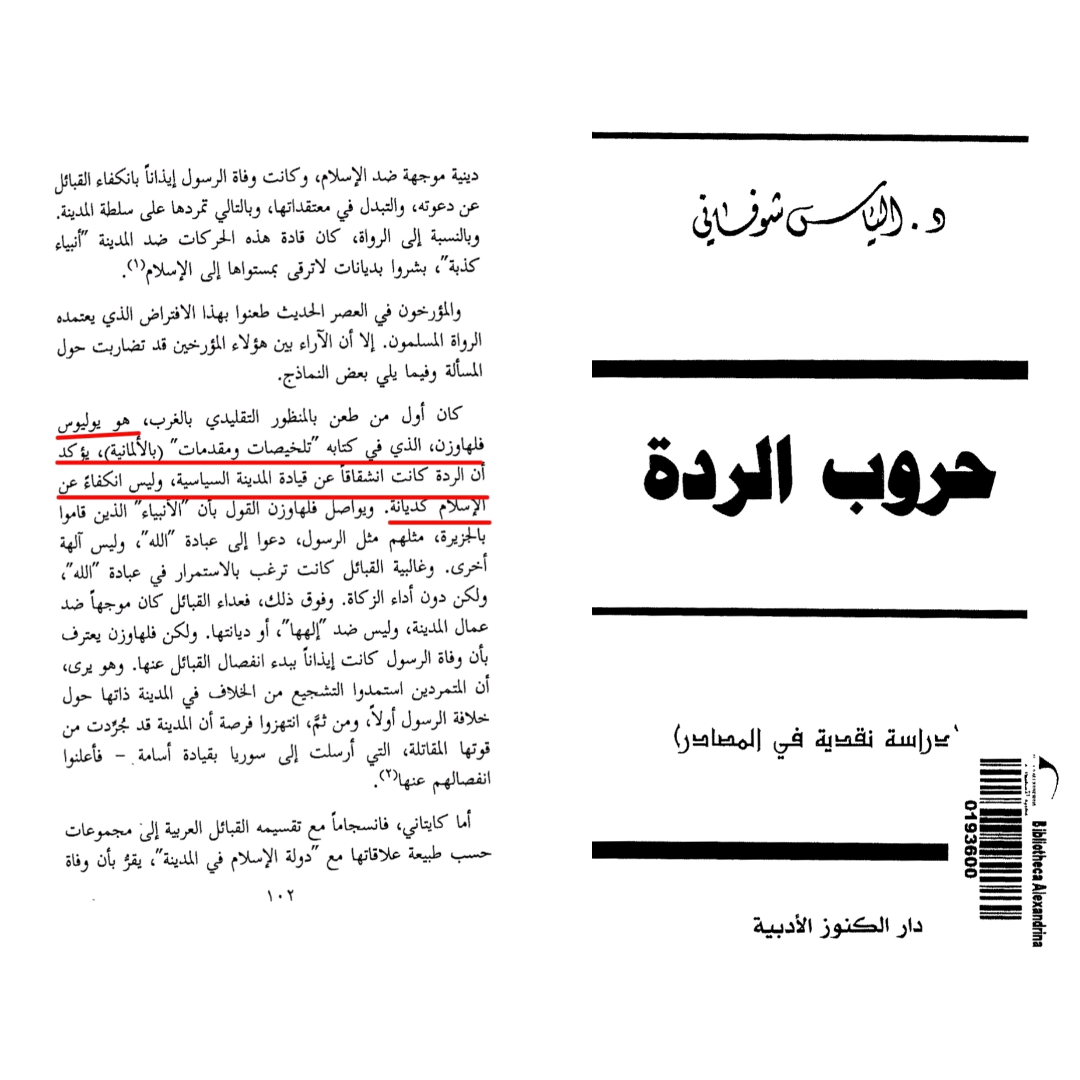 Here Sunan an nasa’i we have a clear hadith that states they can be crucified or killed or banished from the land the commentary of Darussalam proves so (Sunan an-nasâ’i 4048)
Here Sunan an nasa’i we have a clear hadith that states they can be crucified or killed or banished from the land the commentary of Darussalam proves so (Sunan an-nasâ’i 4048)
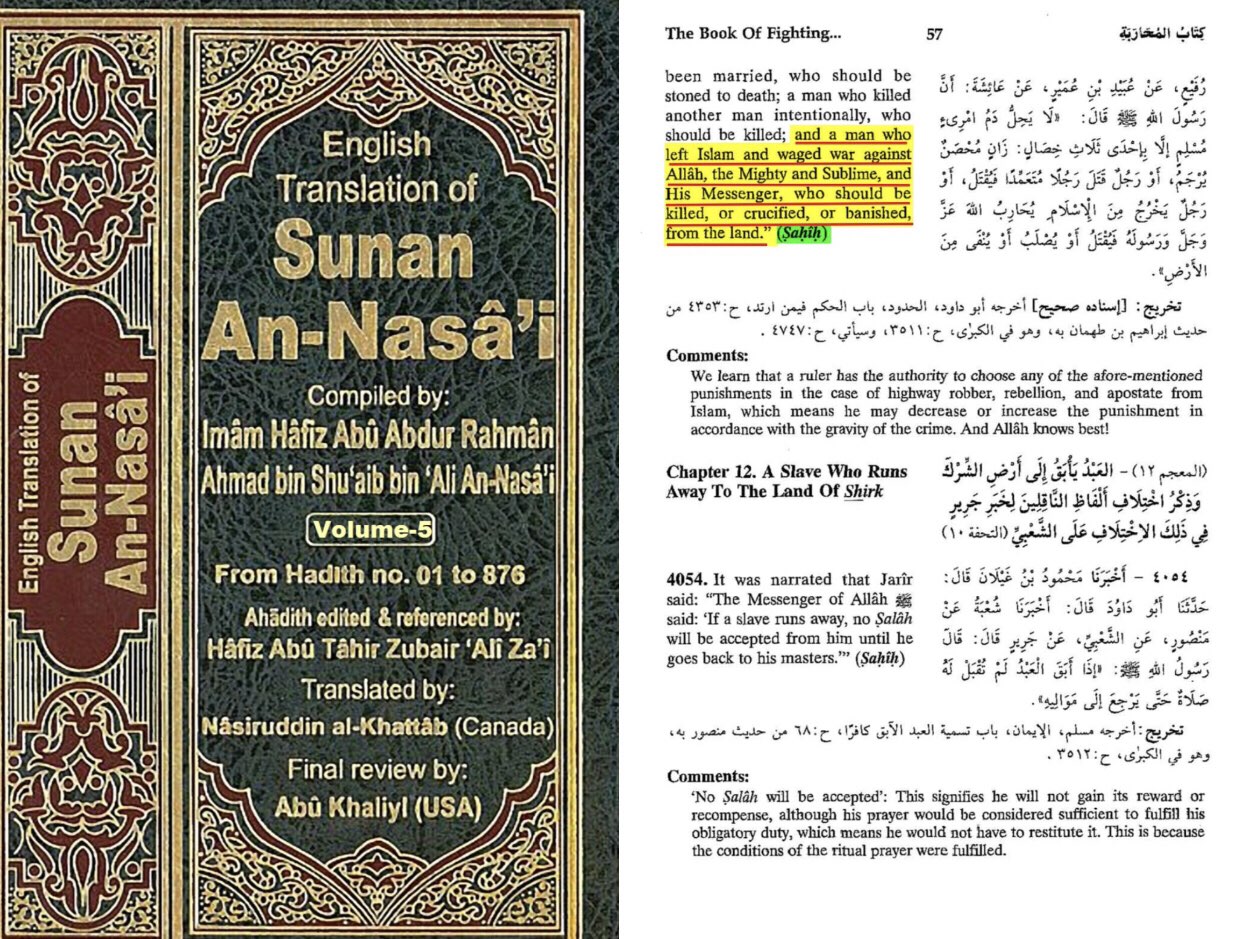 In ruh al-ma’any of the Qūr’an 5:33 it states: “and some people went to that the verse was revealed in apostates and no other than them
In ruh al-ma’any of the Qūr’an 5:33 it states: “and some people went to that the verse was revealed in apostates and no other than them
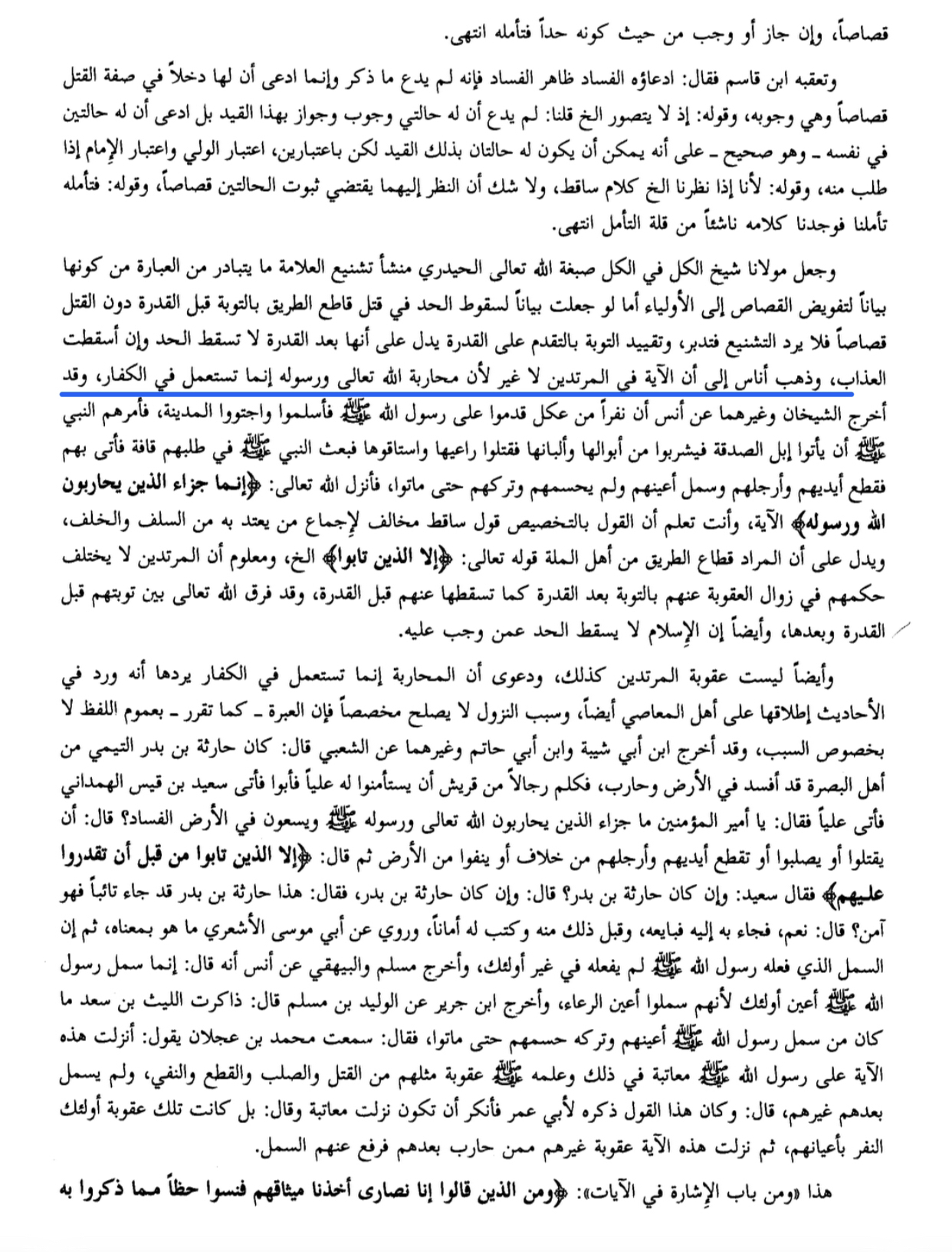 Lastly
Lastly
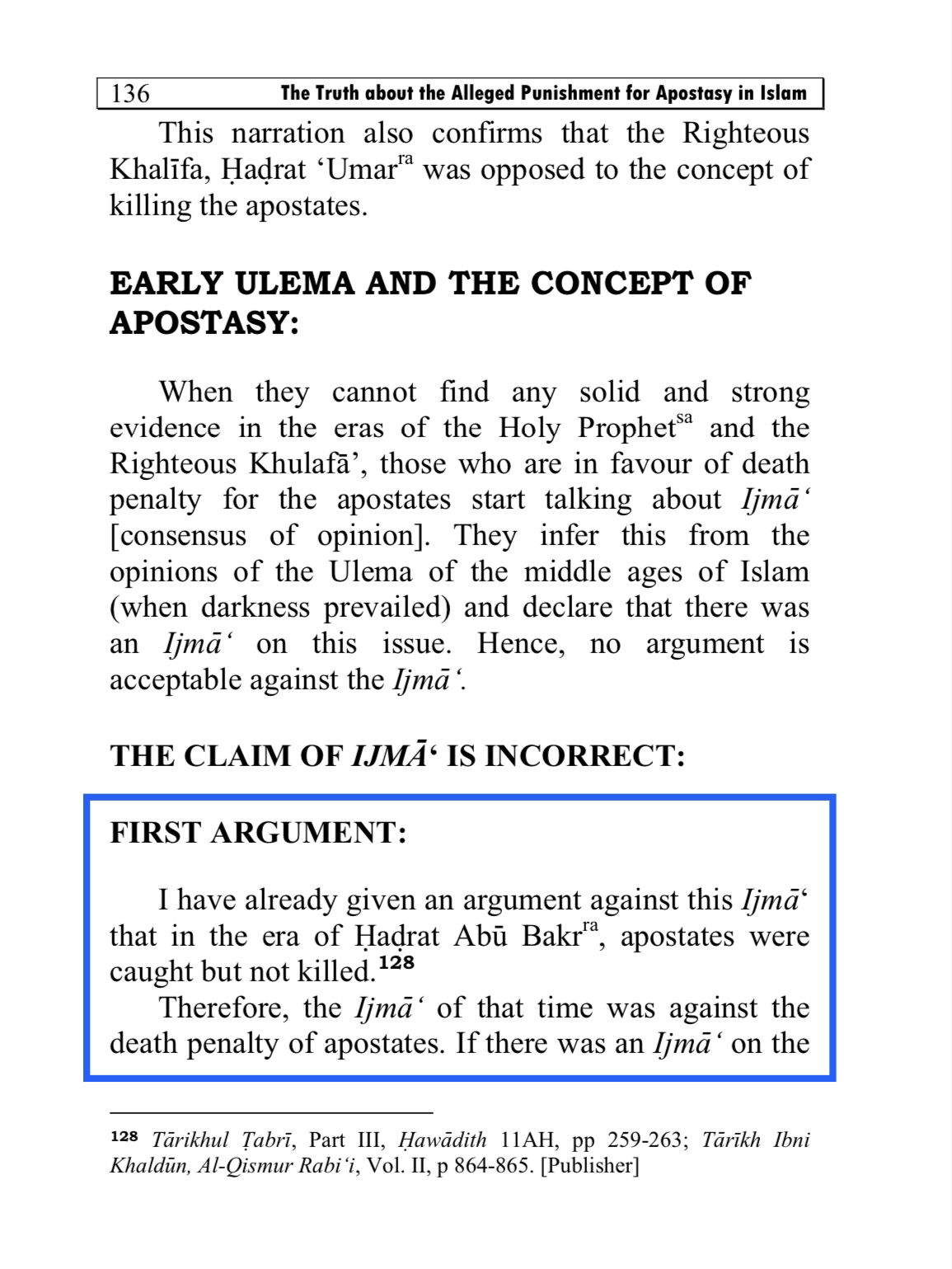 https://shamela.ws/book/17768/5633
https://shamela.ws/book/17768/5633
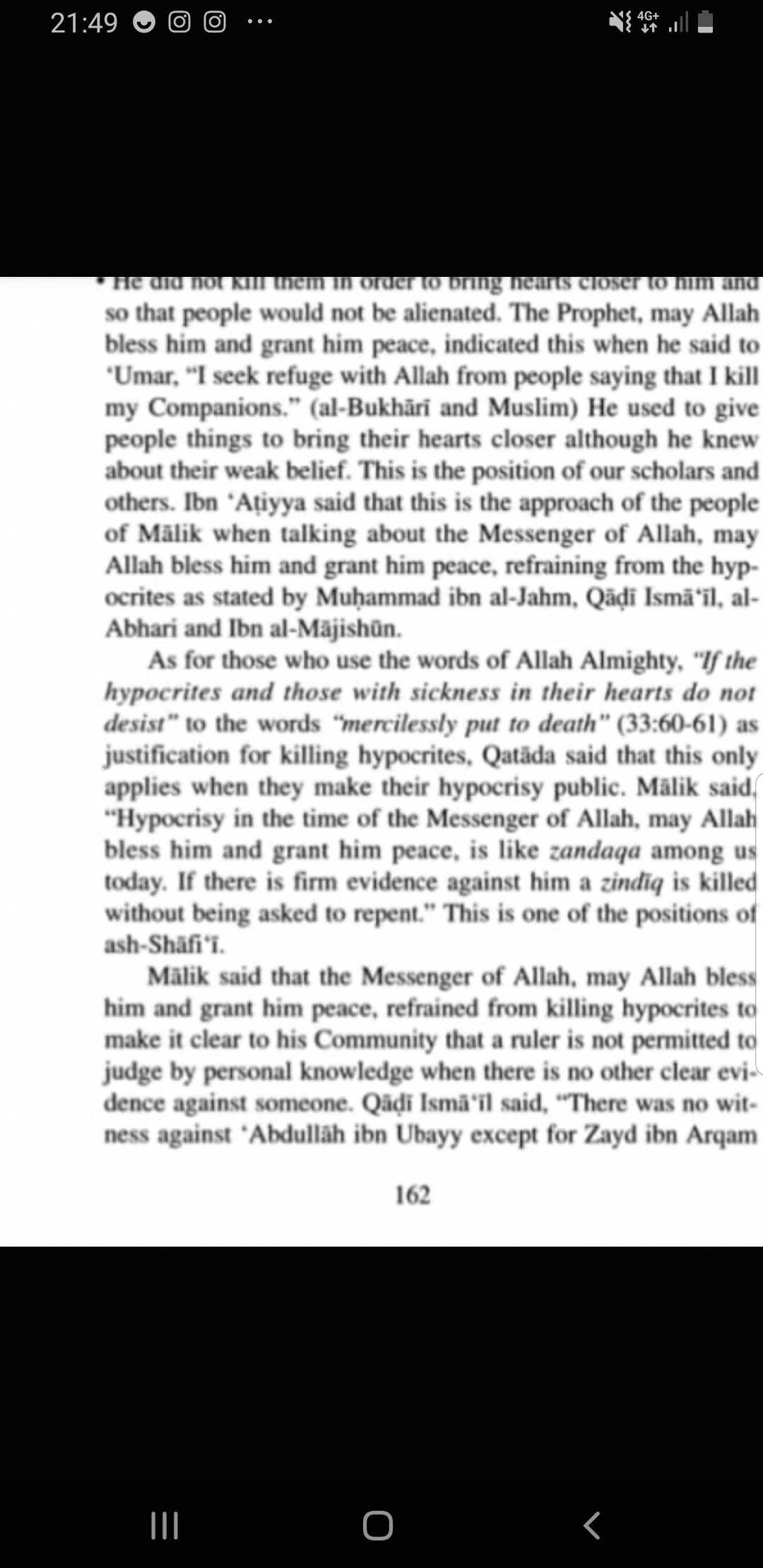
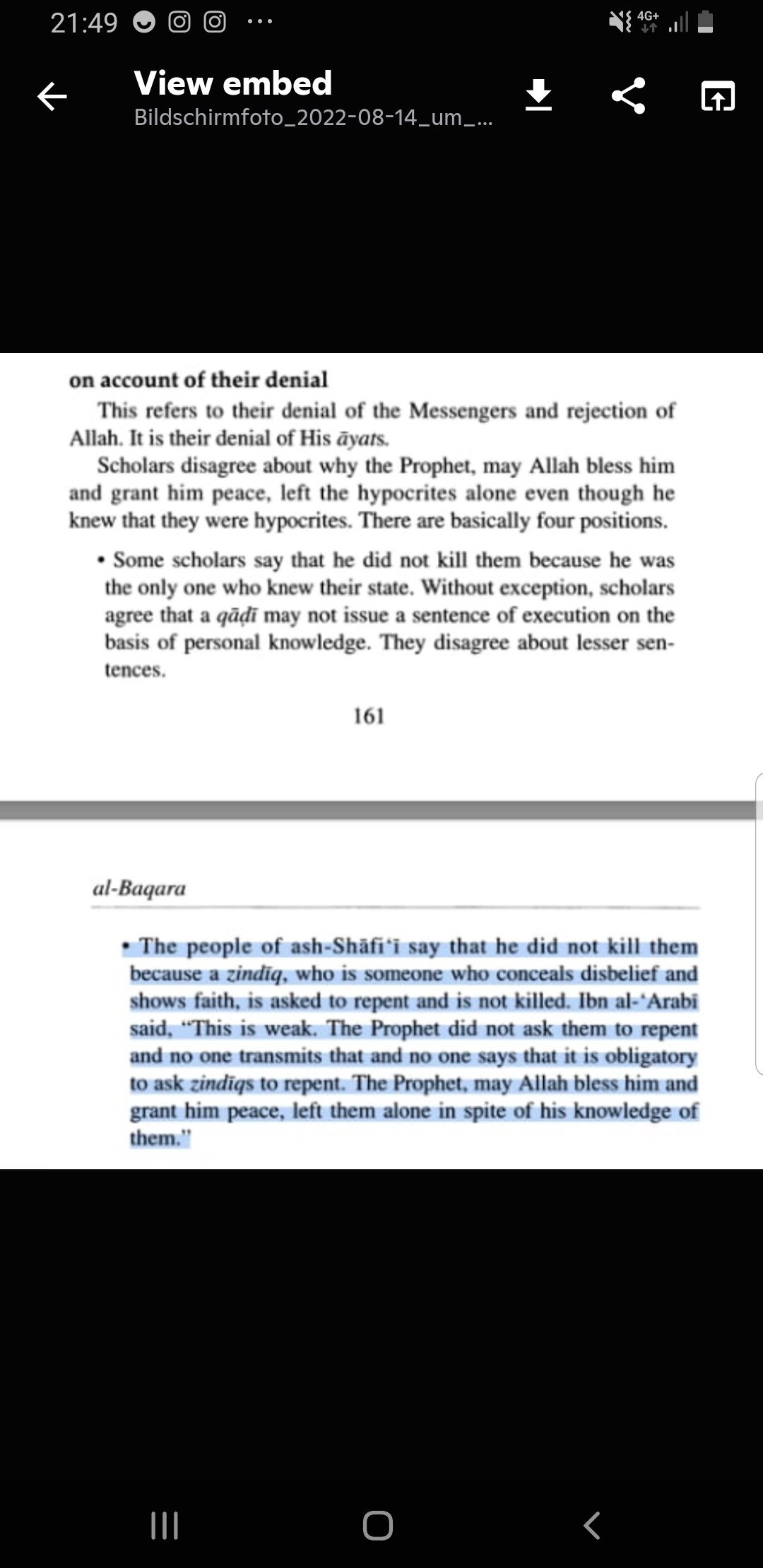
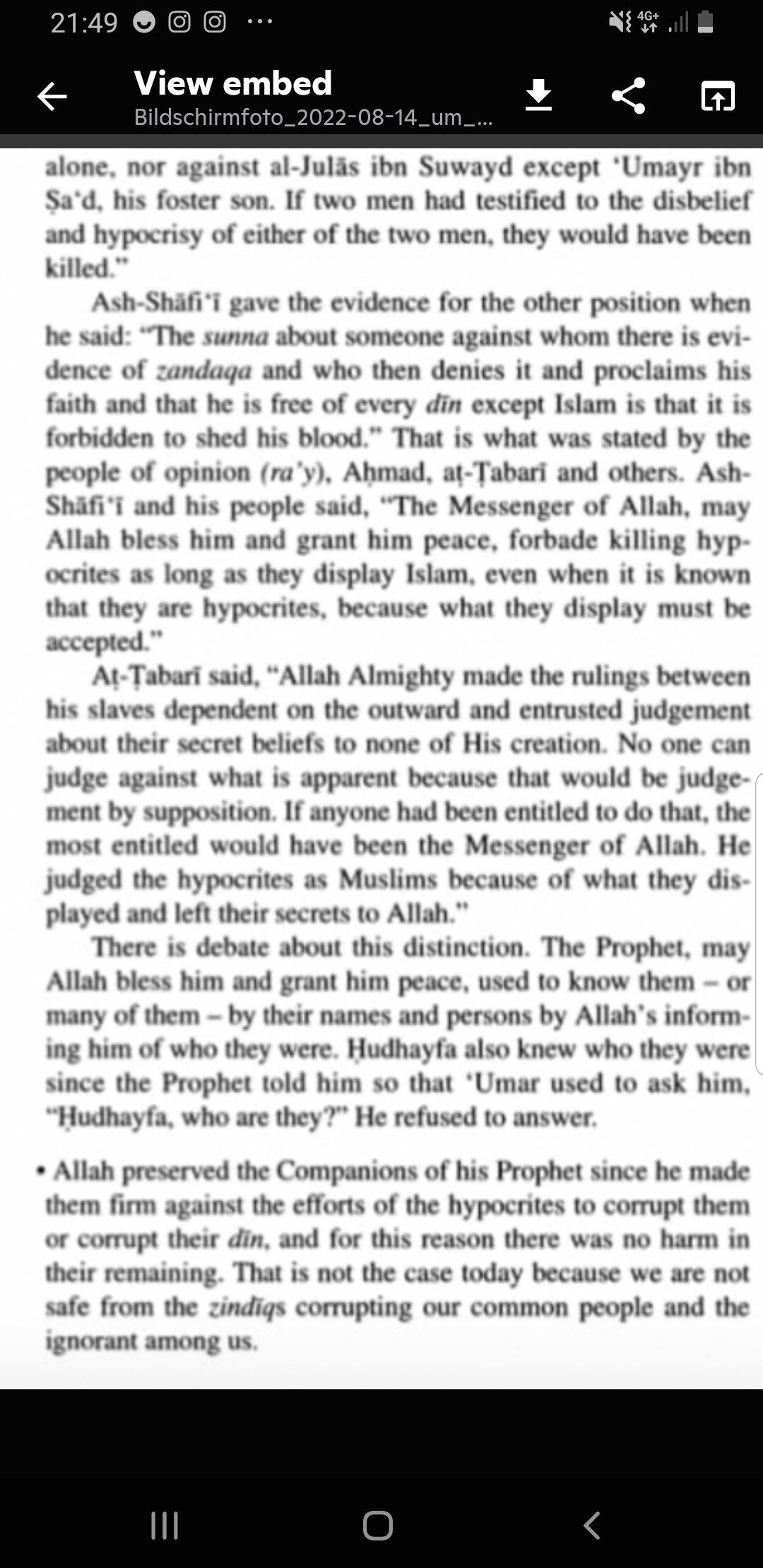 Surah Aal-i-Imraan (The Family of Imraan)
3:72
A group among the People of the Book said ˹to one another˺, “Believe in what has been revealed to the believers in the morning and reject it in the evening, so they may abandon their faith.
Translation: Dr. Mustafa Khattab, the Clear Quran | Medinan
This is a pdf also refuting the idea and how much was it applied historically
Surah Aal-i-Imraan (The Family of Imraan)
3:72
A group among the People of the Book said ˹to one another˺, “Believe in what has been revealed to the believers in the morning and reject it in the evening, so they may abandon their faith.
Translation: Dr. Mustafa Khattab, the Clear Quran | Medinan
This is a pdf also refuting the idea and how much was it applied historically
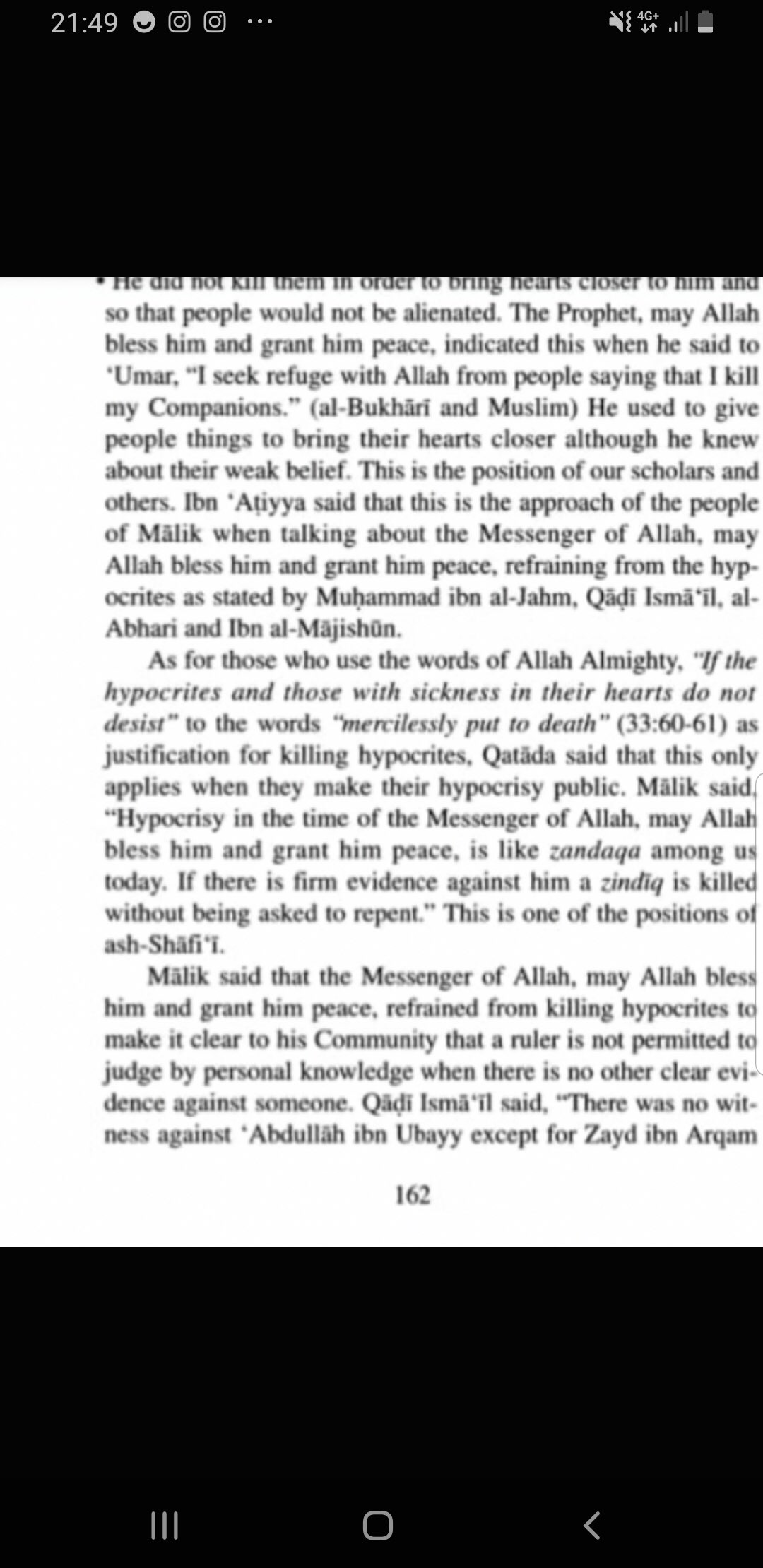
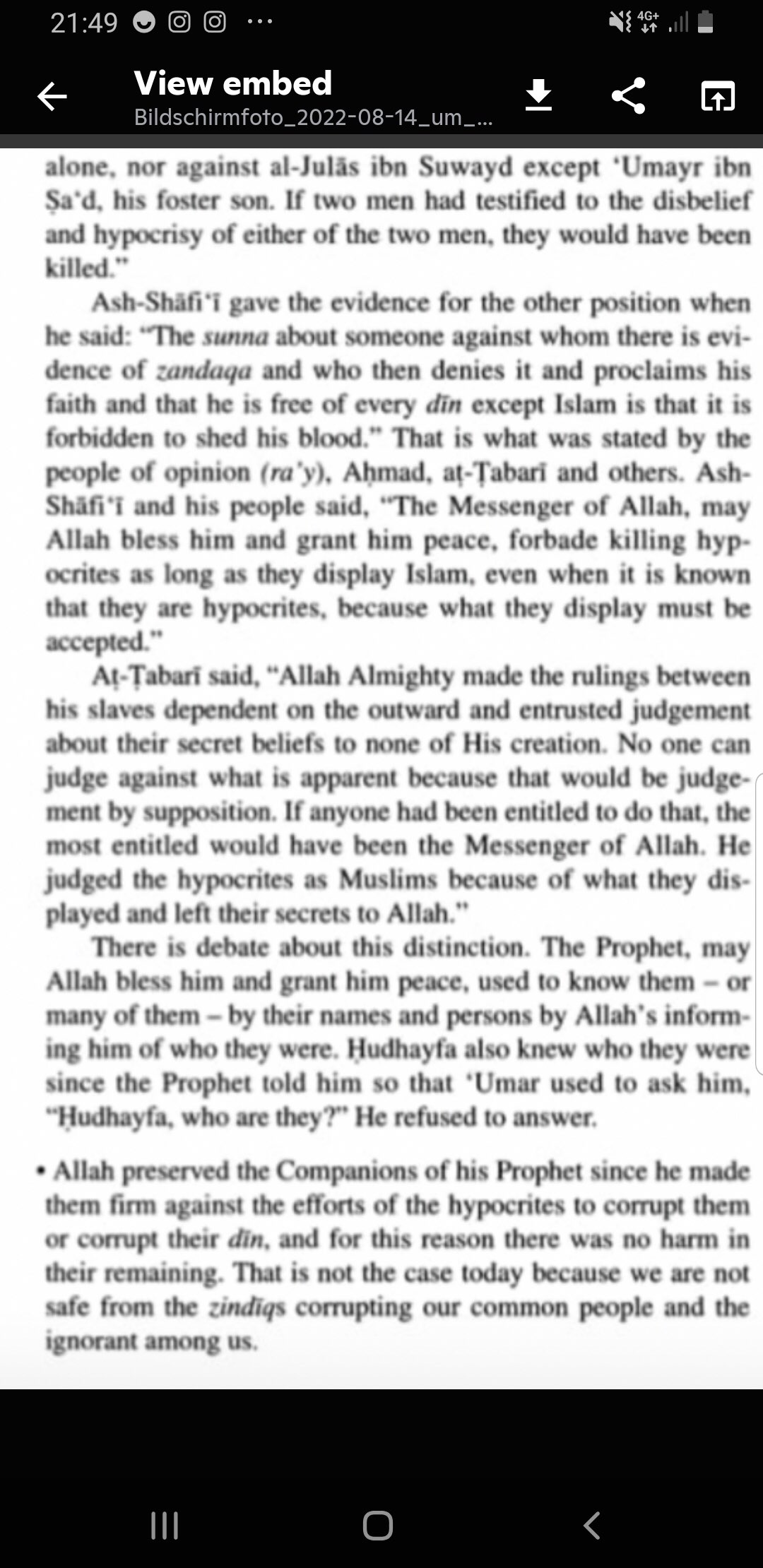
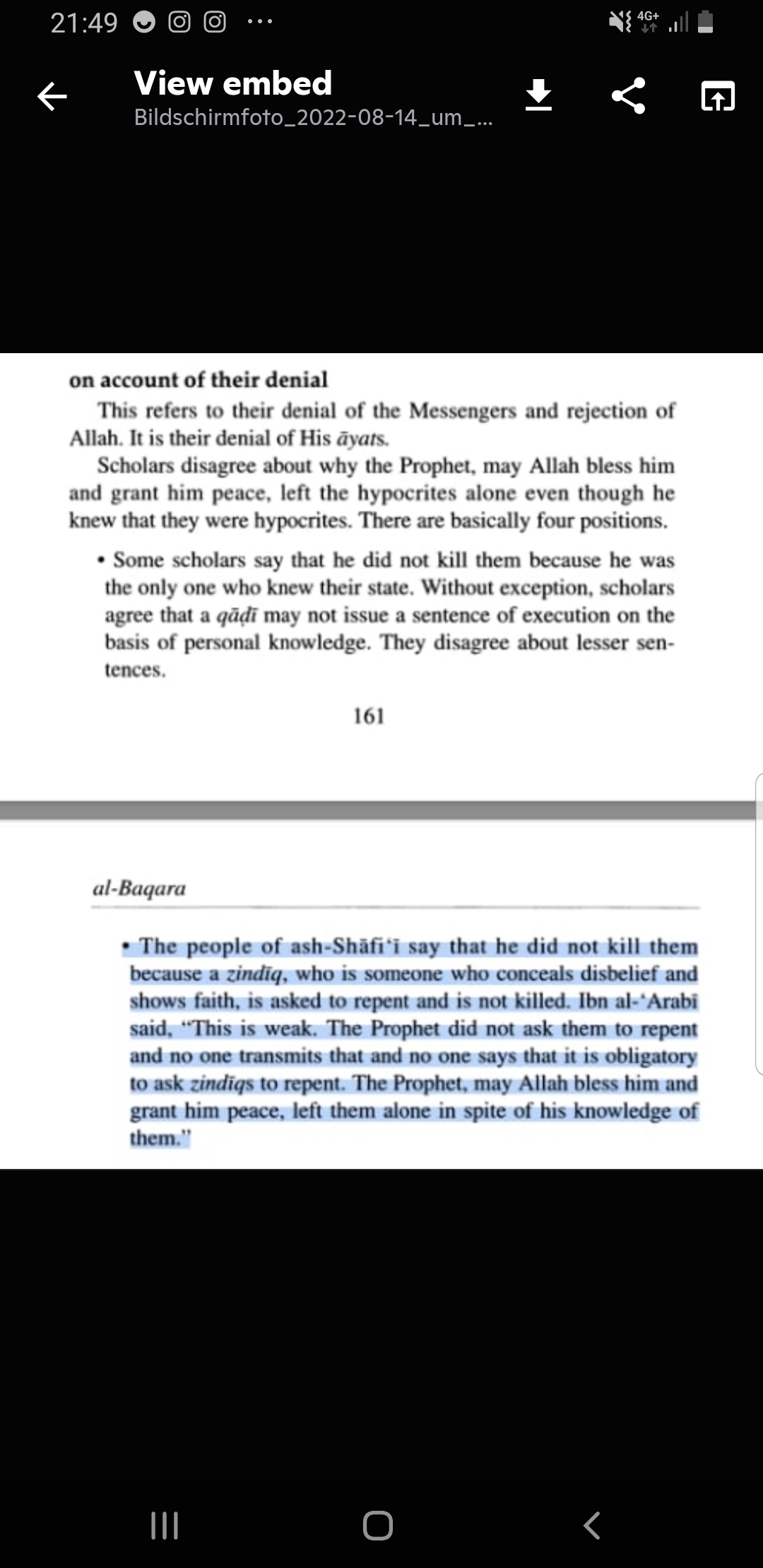 Al-Tahawi (d. 321 A.H) made an entire chapter about this topic in his Mushkil al-Athar 5/45: https://al-maktaba.org/book/22547/1839.
Rashid Rida: http://www.fatawa.com/view/577
Ibn Hazm said:
ومنهم من قال : بالاستتابة أبدا وإيداع السجن فقط كما قد صح عن عمر
„Some of them held the opinion that apostates should be given all the time to repent and to keep them in prison, as it is well established from ‘Umar.“
HA
He also said وَطَائِفَةٌ قَالَتْ: يُسْتَتَابُ أَبَدًا، وَلَا يُقْتَلُ.
https://ar.wikisource.org/wiki/%D9%85%D8%AD%D9%84%D9%89_%D8%A7%D8%A8%D9%86_%D8%AD%D8%B2%D9%85_-_
%D8%A7%D9%84%D9%85%D8%AC%D9%84%D8%AF_%D8%A7%D9%84%D8%B3%D8%A7%D8%AF%D8%B3/%D8%A7%D9%84%D8%B5%D9%81%D8%AD%D8%A9_
%D8%A7%D9%84%D8%B3%D8%A7%D8%AF%D8%B3%D8%A9_%D9%88%D8%A7%D9%84%D8%AE%D9%85%D8%B3%D9%88%D9%86
https://al-maktaba.org/book/767/5018
An-Nawawi (d. 676 A.H) said:
وقال الثوري يستتاب أبدا ويحبس إلى أن يتوب أو يموت.
„And al-Thawri said that he (the Murtad) is called to repent forever and he will be imprisoned until he repents or dies.“
(Kitab al-Majmu' Sharh al-Muhaddhab 19/230: https://al-maktaba.org/book/2186/9245)
Abu Hayyan al-Andalusi (d. 745 A.H) said about the issue of killing the Murtad:
„As for his Hukm with regards to killing, an-Nakha'i and al-Thawri said: he [the Murtad] is called to repent in prison forever.
(Al-Bahr al-Muhit fi al-Tafsir 2/392-393: https://al-maktaba.org/book/23591/1056#p1)
Al-Tahawi (d. 321 A.H) made an entire chapter about this topic in his Mushkil al-Athar 5/45: https://al-maktaba.org/book/22547/1839.
Rashid Rida: http://www.fatawa.com/view/577
Ibn Hazm said:
ومنهم من قال : بالاستتابة أبدا وإيداع السجن فقط كما قد صح عن عمر
„Some of them held the opinion that apostates should be given all the time to repent and to keep them in prison, as it is well established from ‘Umar.“
HA
He also said وَطَائِفَةٌ قَالَتْ: يُسْتَتَابُ أَبَدًا، وَلَا يُقْتَلُ.
https://ar.wikisource.org/wiki/%D9%85%D8%AD%D9%84%D9%89_%D8%A7%D8%A8%D9%86_%D8%AD%D8%B2%D9%85_-_
%D8%A7%D9%84%D9%85%D8%AC%D9%84%D8%AF_%D8%A7%D9%84%D8%B3%D8%A7%D8%AF%D8%B3/%D8%A7%D9%84%D8%B5%D9%81%D8%AD%D8%A9_
%D8%A7%D9%84%D8%B3%D8%A7%D8%AF%D8%B3%D8%A9_%D9%88%D8%A7%D9%84%D8%AE%D9%85%D8%B3%D9%88%D9%86
https://al-maktaba.org/book/767/5018
An-Nawawi (d. 676 A.H) said:
وقال الثوري يستتاب أبدا ويحبس إلى أن يتوب أو يموت.
„And al-Thawri said that he (the Murtad) is called to repent forever and he will be imprisoned until he repents or dies.“
(Kitab al-Majmu' Sharh al-Muhaddhab 19/230: https://al-maktaba.org/book/2186/9245)
Abu Hayyan al-Andalusi (d. 745 A.H) said about the issue of killing the Murtad:
„As for his Hukm with regards to killing, an-Nakha'i and al-Thawri said: he [the Murtad] is called to repent in prison forever.
(Al-Bahr al-Muhit fi al-Tafsir 2/392-393: https://al-maktaba.org/book/23591/1056#p1)
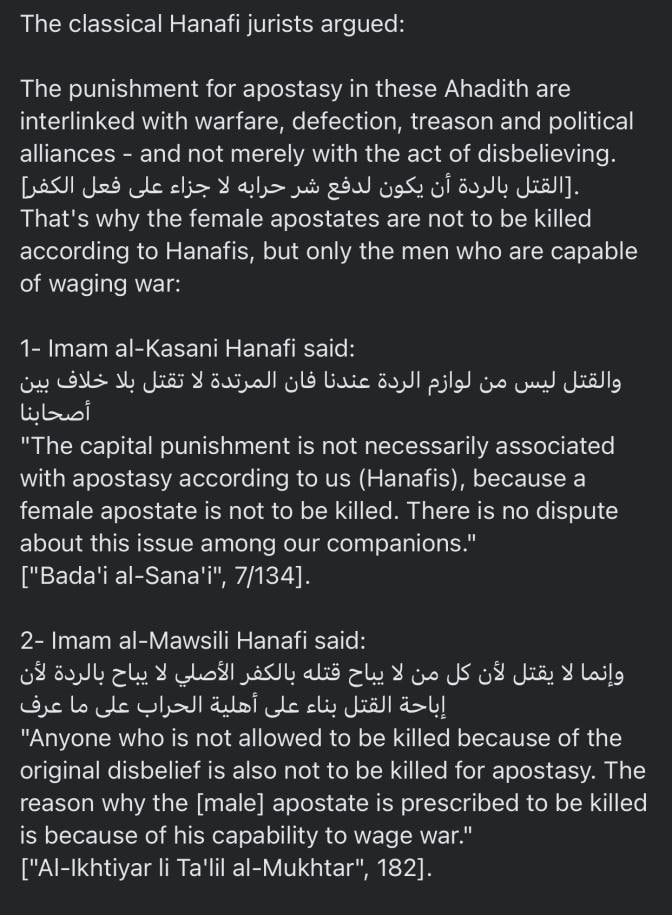
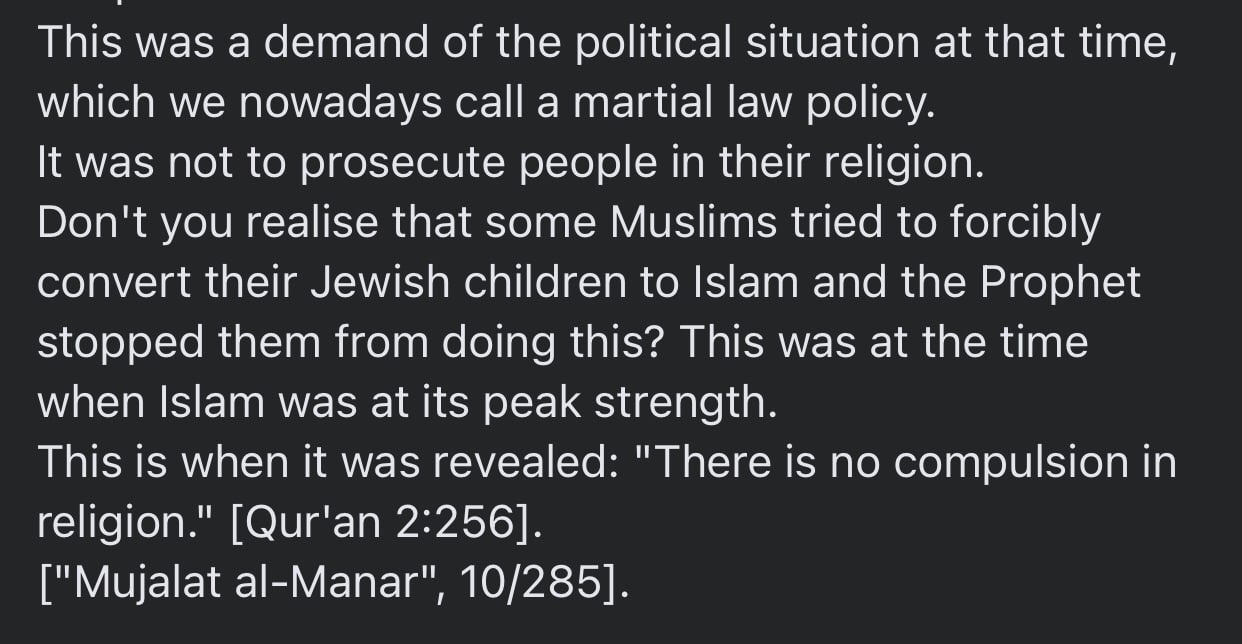
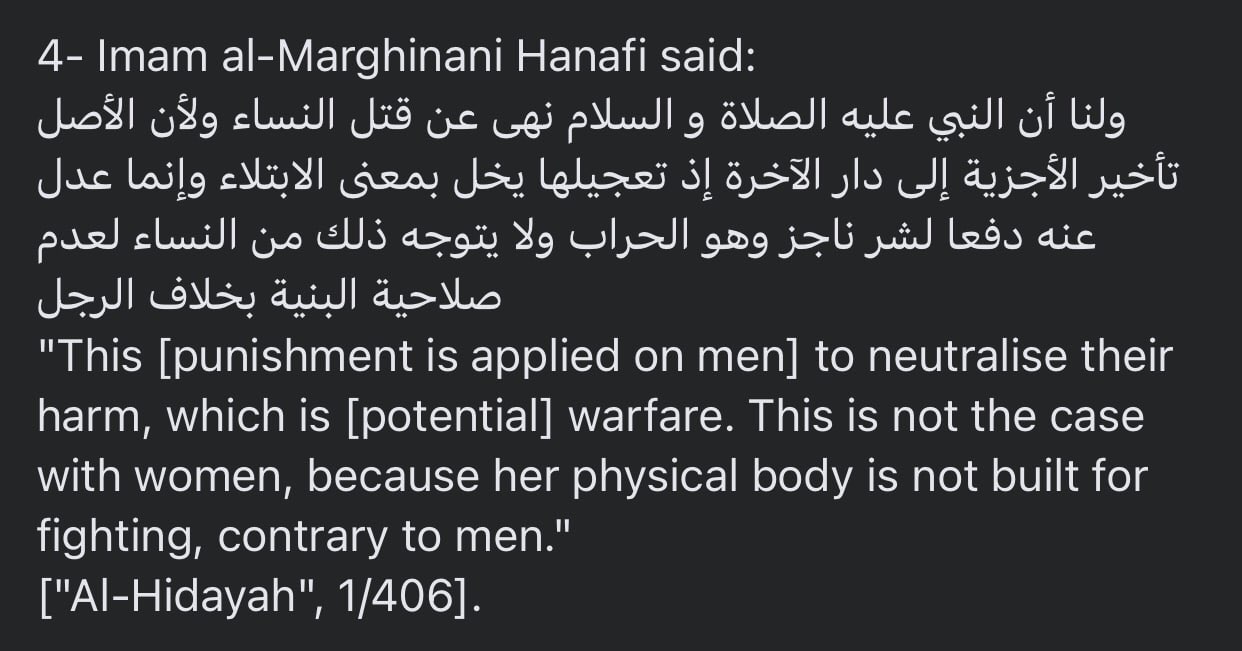
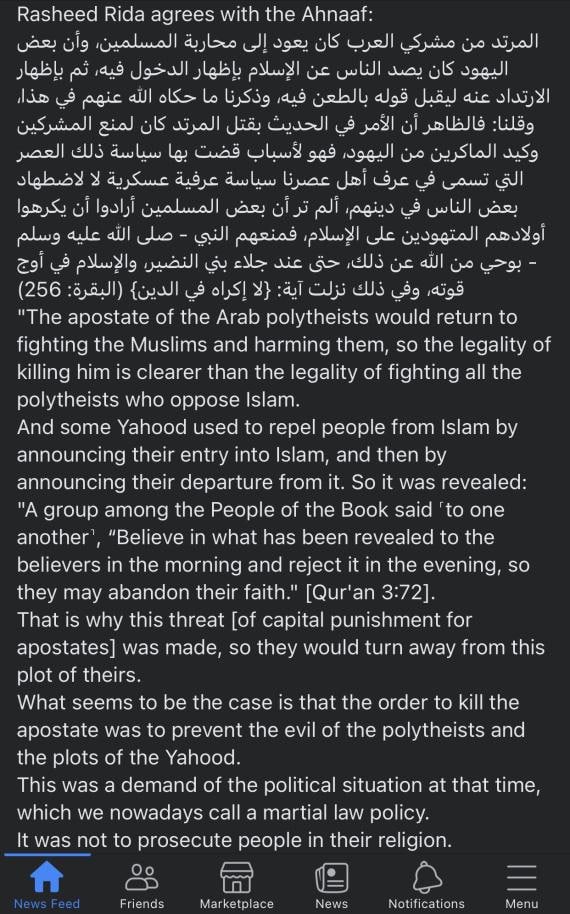
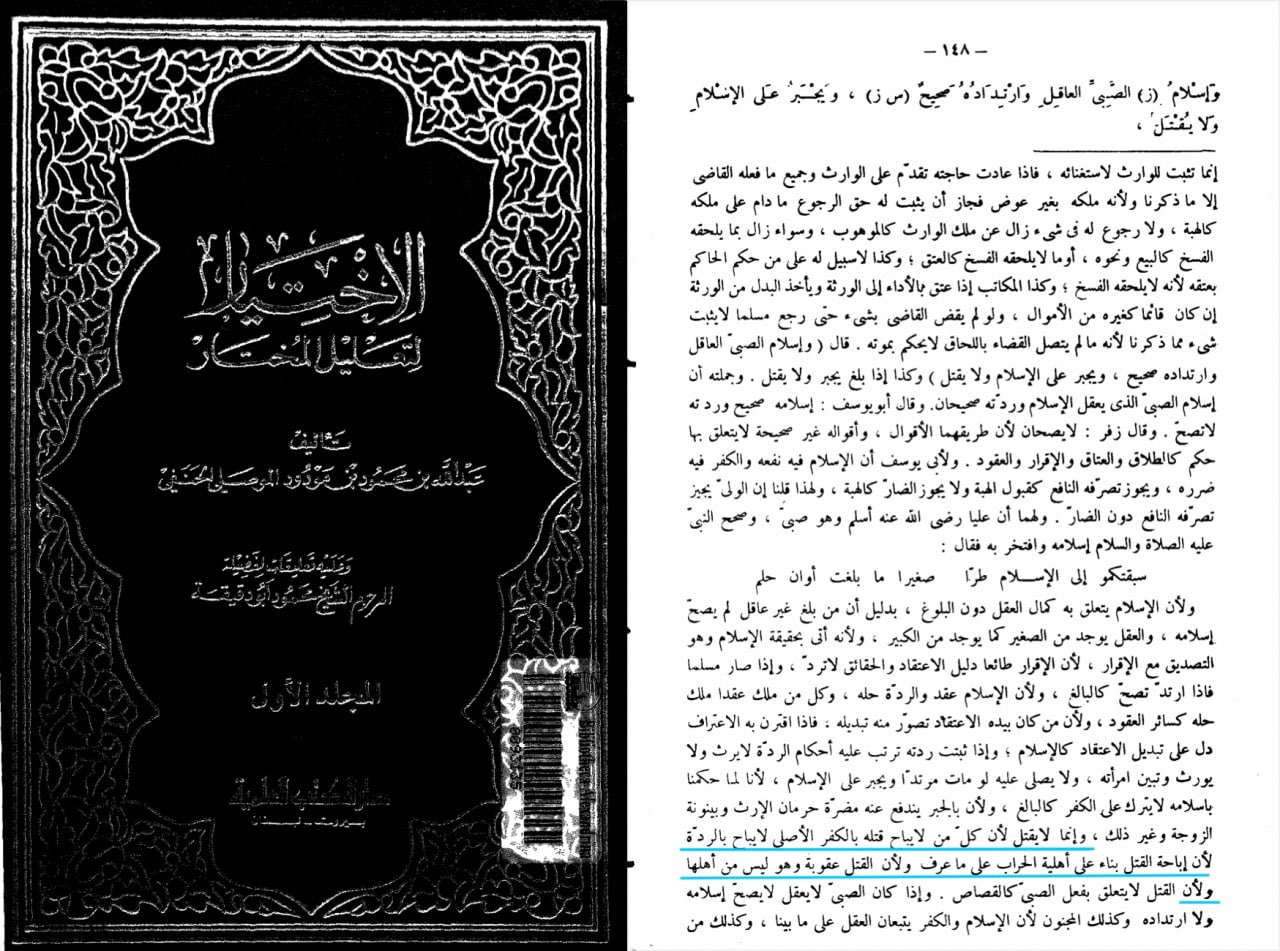
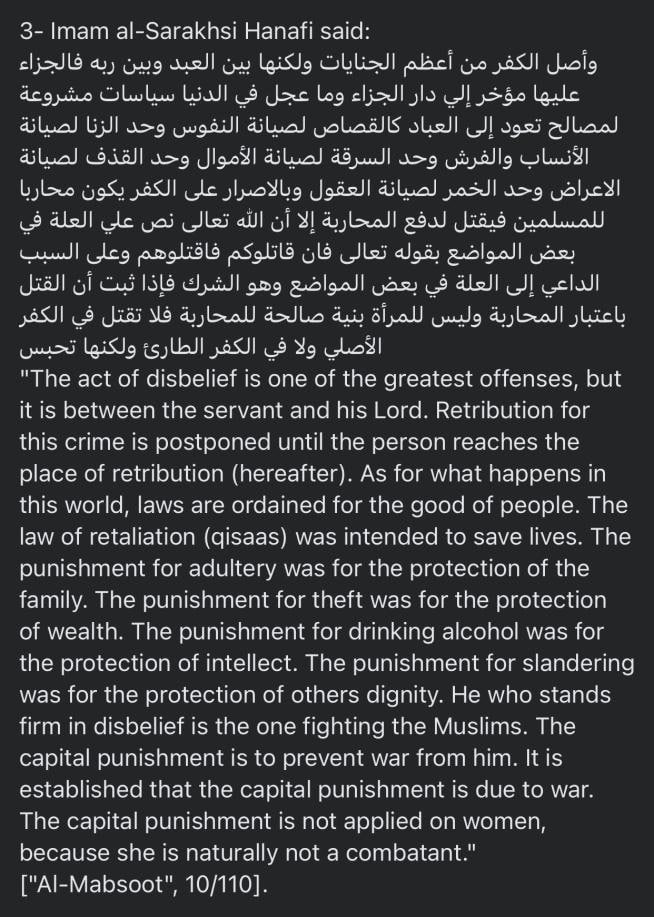 Al-Mawsili al-Hanafi (d. 683 A.H) wrote:
وَإِنَّمَا لَا يُقْتَلُ لِأَنَّ كُلَّ مَنْ لَا يُبَاحُ قَتْلُهُ بِالْكُفْرِ الْأَصْلِيِّ لَا يُبَاحُ بِالرِّدَّةِ لِأَنَّ إِبَاحَةَ الْقَتْلِ بِنَاءً عَلَى أَهْلِيَّةِ الْحِرَابِ عَلَى مَا عُرِفَ وَلِأَنَّ الْقَتْلَ عُقُوبَةٌ وَهُوَ لَيْسَ مِنْ أَهْلِهَا وَلِأَنَّ
„Anyone who is not allowed to be killed because of his original disbelief is also not allowed to be killed for apostasy.
The reason why the (male) apostate is prescribed to be killed is because of his capability to wage war.“
(Al-Ikhtiyar li Ta'lil al-Mukhtar 4/148: https://al-maktaba.org/book/1066/670)
(Kitab al-Tajrid 11/343: https://shamela.ws/book/17768/5633)
(Al-Hawi al-Kabir 13/156; 13/332: https://www.islamweb.net/ar/library/index.php?page=bookcontents&idfrom=7281&idto=7281&bk_no=94&ID=1638)
Hanafis about non combatants: https://shamela.ws/book/17768/5919
Al-Jasas about old men https://al-maktaba.org/book/33132/2616#p1
https://muslimallegationhunters.home.blog/2019/09/28/explanation-of-the-apostasy-punishment-in-islam/
Al-Mawsili al-Hanafi (d. 683 A.H) wrote:
وَإِنَّمَا لَا يُقْتَلُ لِأَنَّ كُلَّ مَنْ لَا يُبَاحُ قَتْلُهُ بِالْكُفْرِ الْأَصْلِيِّ لَا يُبَاحُ بِالرِّدَّةِ لِأَنَّ إِبَاحَةَ الْقَتْلِ بِنَاءً عَلَى أَهْلِيَّةِ الْحِرَابِ عَلَى مَا عُرِفَ وَلِأَنَّ الْقَتْلَ عُقُوبَةٌ وَهُوَ لَيْسَ مِنْ أَهْلِهَا وَلِأَنَّ
„Anyone who is not allowed to be killed because of his original disbelief is also not allowed to be killed for apostasy.
The reason why the (male) apostate is prescribed to be killed is because of his capability to wage war.“
(Al-Ikhtiyar li Ta'lil al-Mukhtar 4/148: https://al-maktaba.org/book/1066/670)
(Kitab al-Tajrid 11/343: https://shamela.ws/book/17768/5633)
(Al-Hawi al-Kabir 13/156; 13/332: https://www.islamweb.net/ar/library/index.php?page=bookcontents&idfrom=7281&idto=7281&bk_no=94&ID=1638)
Hanafis about non combatants: https://shamela.ws/book/17768/5919
Al-Jasas about old men https://al-maktaba.org/book/33132/2616#p1
https://muslimallegationhunters.home.blog/2019/09/28/explanation-of-the-apostasy-punishment-in-islam/
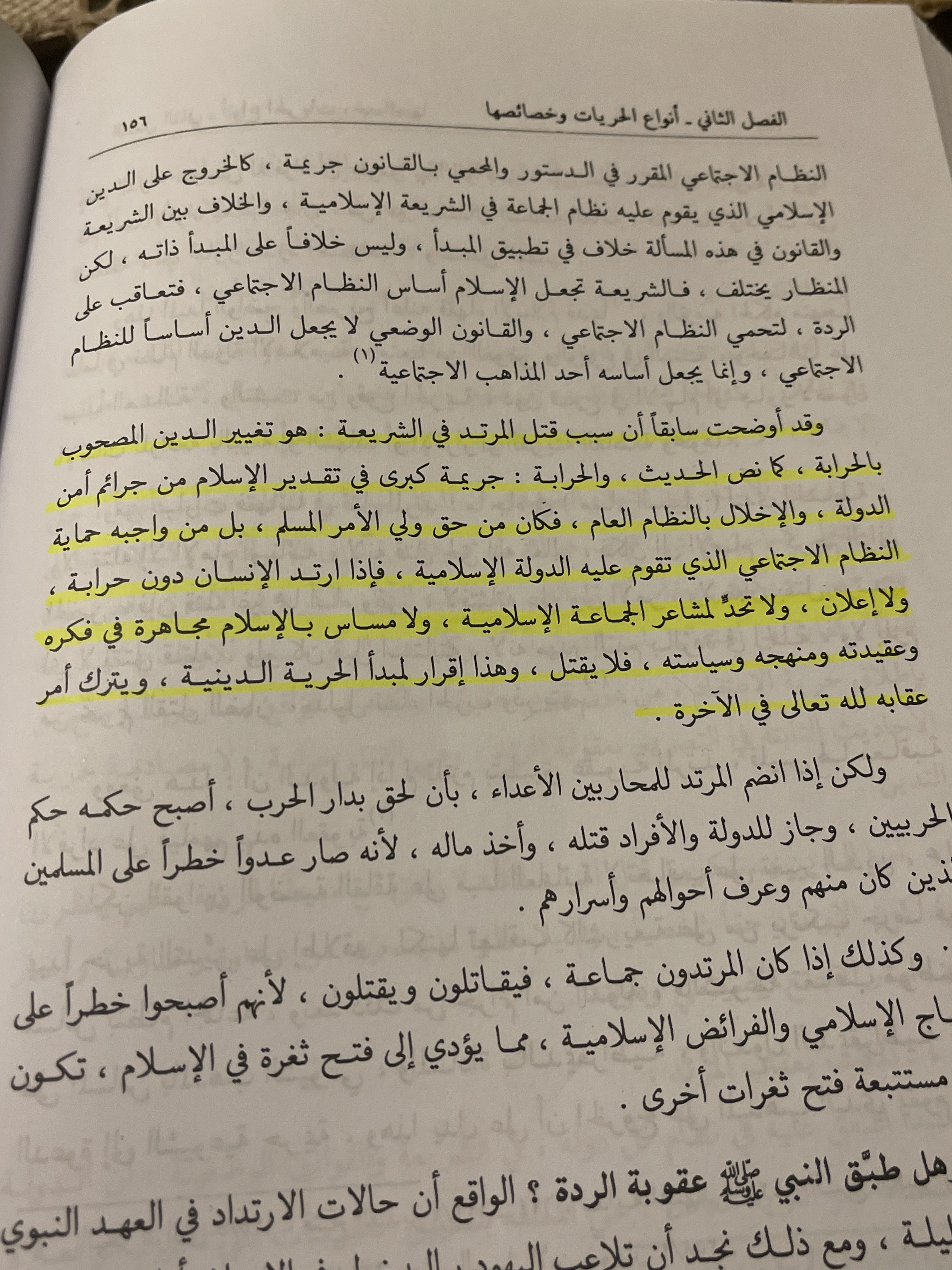 https://discover-the-truth.com/2017/03/11/ali-ibn-abi-talib-did-not-burn-apostates-alive-historical-analysis/
https://discover-the-truth.com/2017/03/11/ali-ibn-abi-talib-did-not-burn-apostates-alive-historical-analysis/
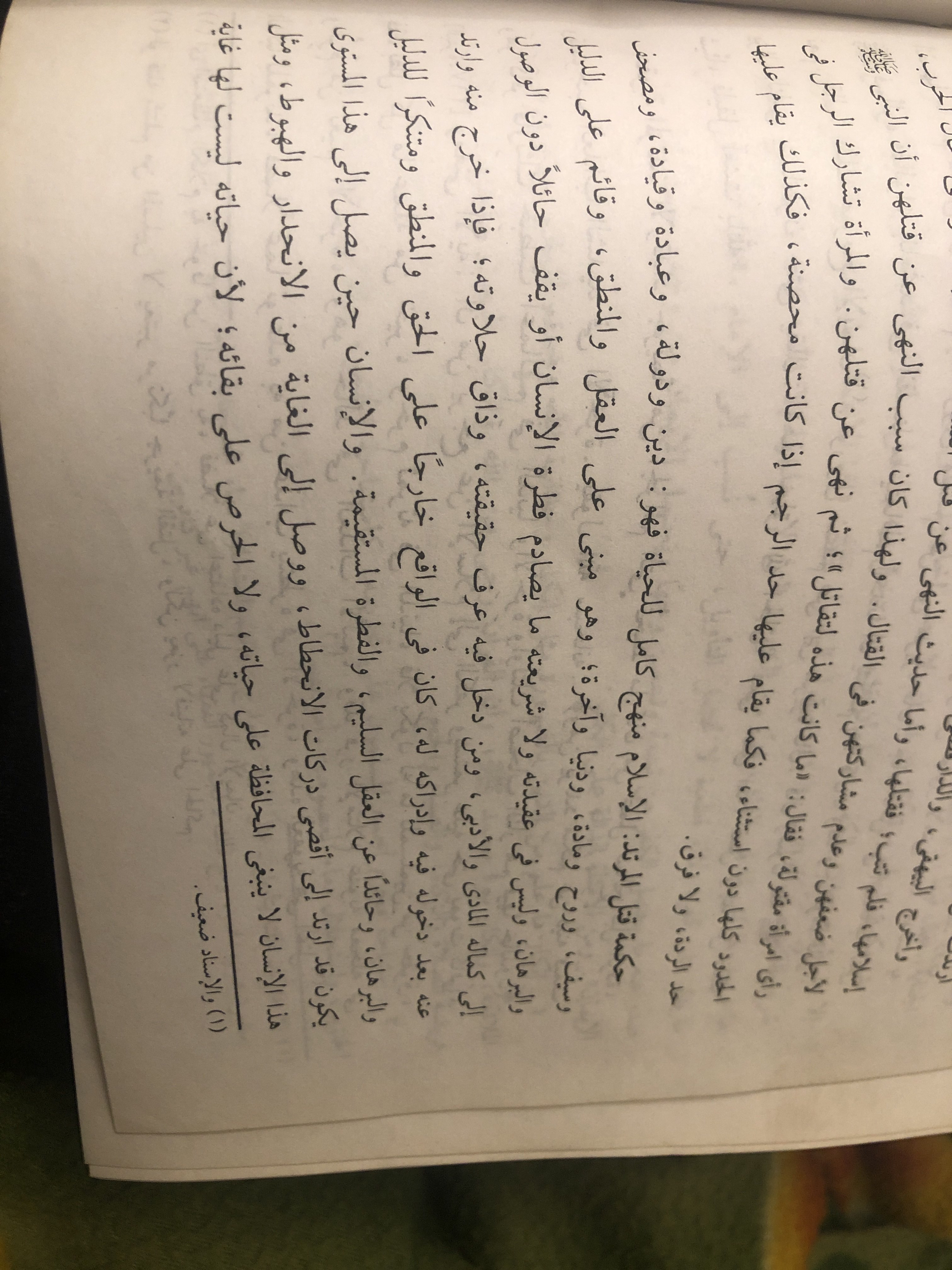
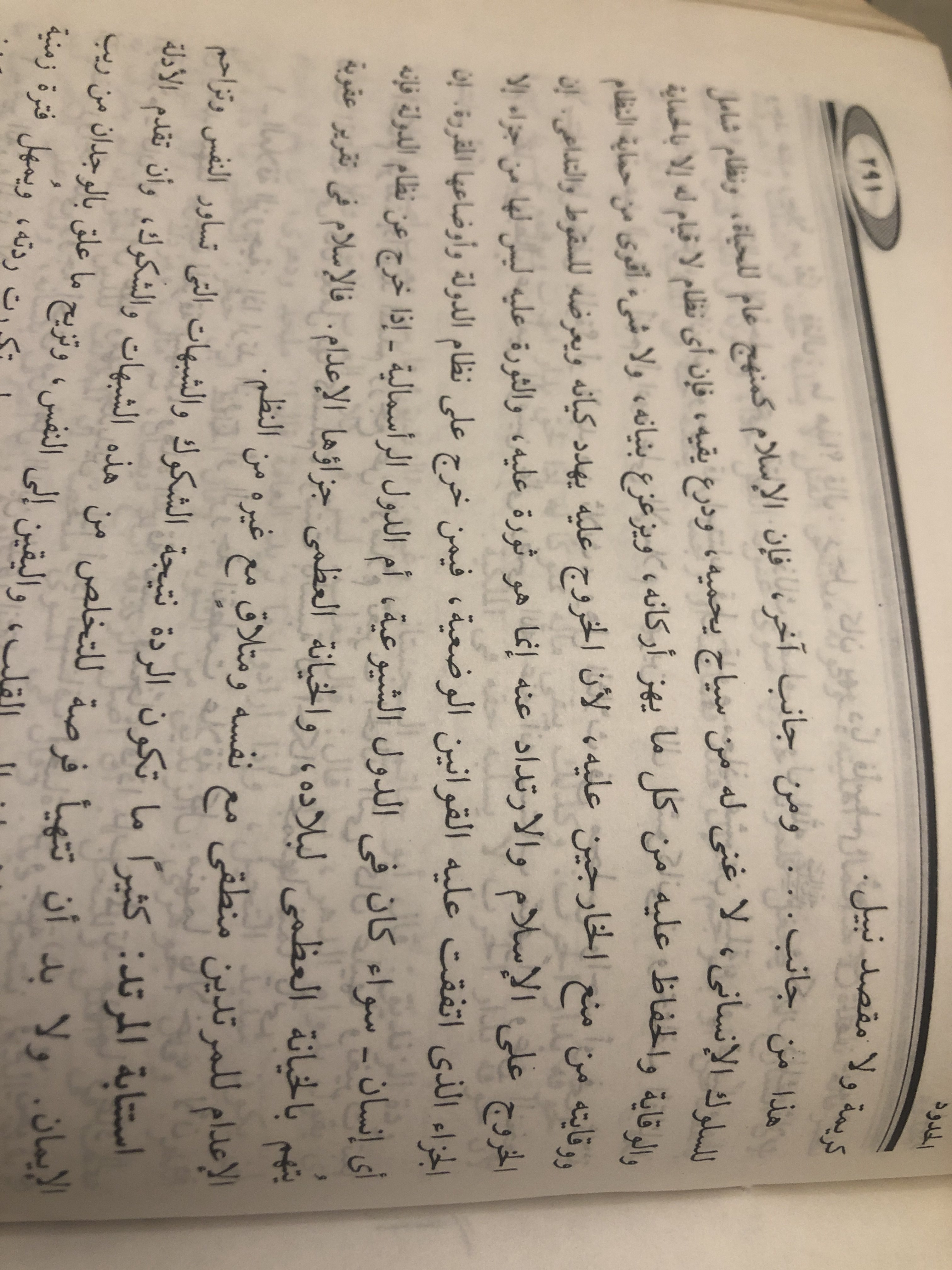 Ibn-e-Qayyim (700 AH), of the Hanbali school of thought, wrote:
‘As for the punishment of execution, it is reserved for the greatest offenses such as those against life, so that its punishment is of similar kind,
such as the offense against the religion by assaulting it and apostatizing from it.
This offense is the first to be punished by execution in order to restrain the aggression of the criminal by every punishment but if he
imprisoned his evil and closed his mouth and accepted Allahs laws on him there is no danger between the Muslims for his staying.’
“I’laam al Mooqieen an Rabbil Aalameen”(Signs that Lead to the Lord of the Worlds). Ibn Qayyim. Vol. 3 pg. 339. Killing and Its Reasons.
Ibn-e-Qayyim (700 AH), of the Hanbali school of thought, wrote:
‘As for the punishment of execution, it is reserved for the greatest offenses such as those against life, so that its punishment is of similar kind,
such as the offense against the religion by assaulting it and apostatizing from it.
This offense is the first to be punished by execution in order to restrain the aggression of the criminal by every punishment but if he
imprisoned his evil and closed his mouth and accepted Allahs laws on him there is no danger between the Muslims for his staying.’
“I’laam al Mooqieen an Rabbil Aalameen”(Signs that Lead to the Lord of the Worlds). Ibn Qayyim. Vol. 3 pg. 339. Killing and Its Reasons.
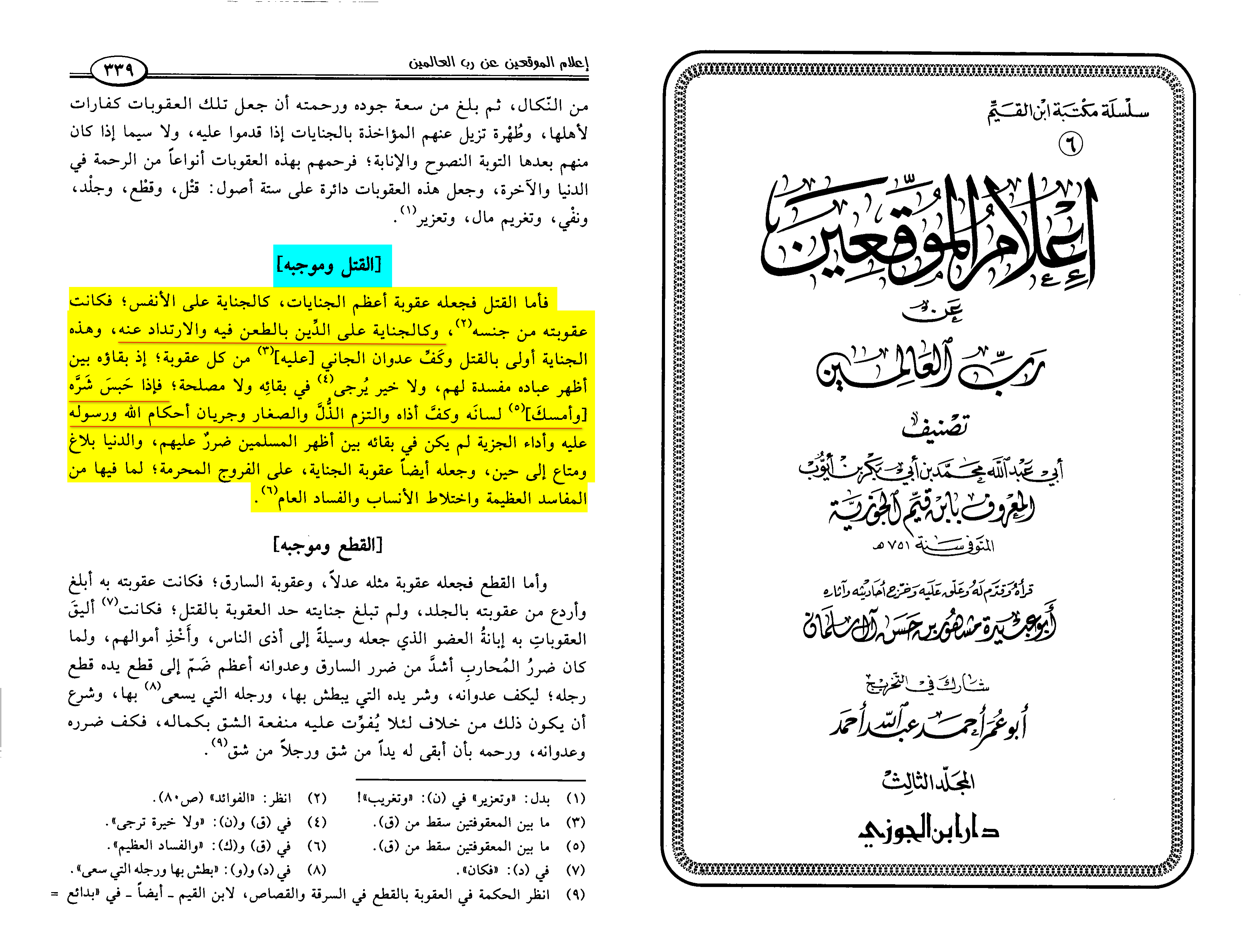 “And from it is that the punishement of the murtad (apostate) is one of the biggest interest that goes back to Muslims because in that
there preservation and protection for the Muslims because without that if we leave apostasy with No punishment then many of the weak
religiously Muslims would also leave their faith”
Majmu’ Rasa’il Ibn ‘Abdeen vol.1, page 319
“And from it is that the punishement of the murtad (apostate) is one of the biggest interest that goes back to Muslims because in that
there preservation and protection for the Muslims because without that if we leave apostasy with No punishment then many of the weak
religiously Muslims would also leave their faith”
Majmu’ Rasa’il Ibn ‘Abdeen vol.1, page 319
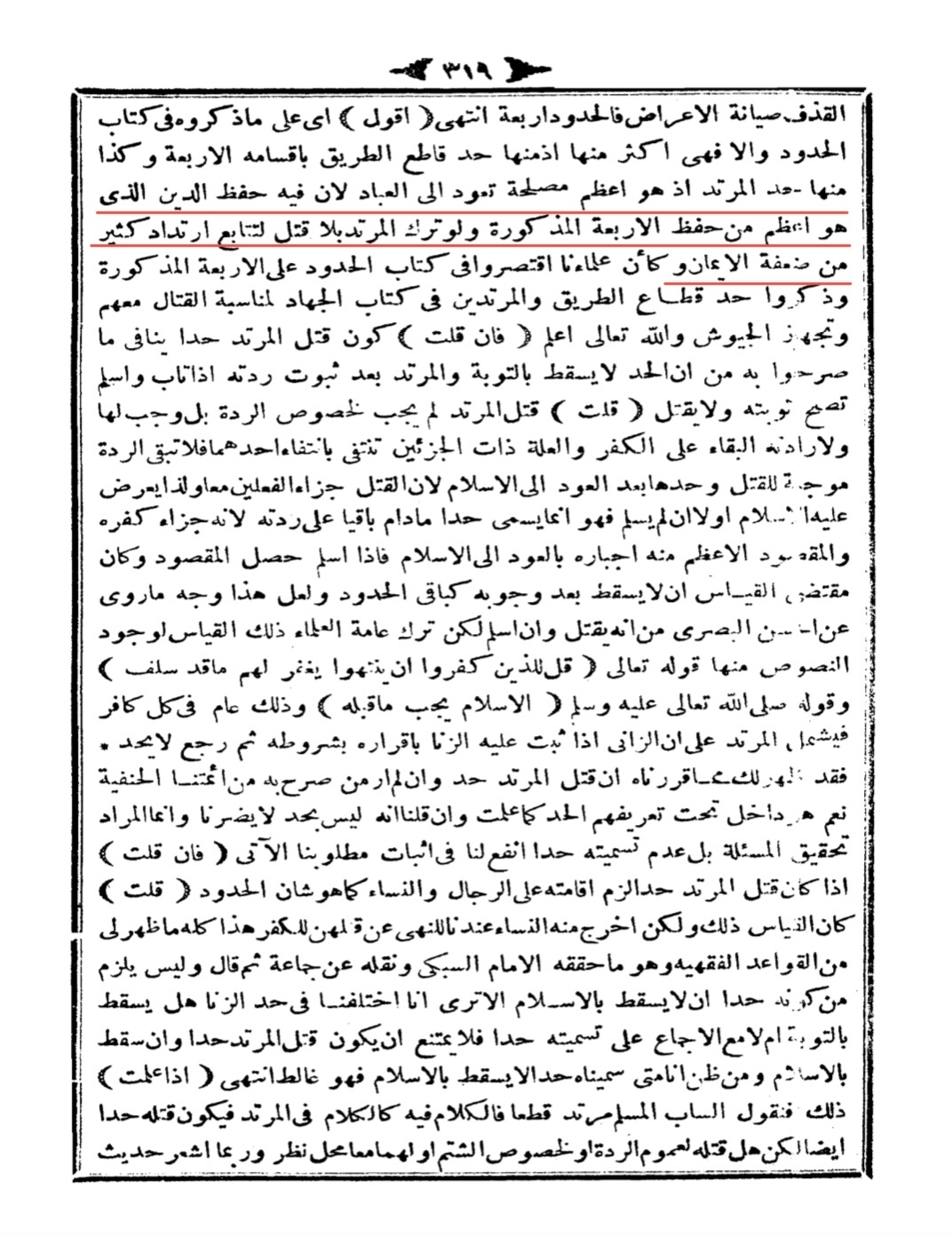 (Al-Muharrar al-Wajiz 3/59: https://shamela.ws/book/23632/1178)
التّجليح: المكاشفة والمجاهرة بالعداوة، والمجالح: المكابر. (اللسان)
Ibn Atiyyah says the Munafiq/Zindiq (a Murtad) is only punished once he does التّجليح and التّجليح is open enmity or open animosity
towards muslimsIbn Atiyyah (d. 542 A.H) said about Qur’an Surah 9 Ayah 73:
(Al-Muharrar al-Wajiz 3/59: https://shamela.ws/book/23632/1178)
التّجليح: المكاشفة والمجاهرة بالعداوة، والمجالح: المكابر. (اللسان)
Ibn Atiyyah says the Munafiq/Zindiq (a Murtad) is only punished once he does التّجليح and التّجليح is open enmity or open animosity towards muslims
(Al-Muharrar al-Wajiz 3/59: https://shamela.ws/book/23632/1178)
التّجليح: المكاشفة والمجاهرة بالعداوة، والمجالح: المكابر. (اللسان)
Ibn Atiyyah says the Munafiq/Zindiq (a Murtad) is only punished once he does التّجليح and التّجليح is open enmity or open animosity
towards muslimsIbn Atiyyah (d. 542 A.H) said about Qur’an Surah 9 Ayah 73:
(Al-Muharrar al-Wajiz 3/59: https://shamela.ws/book/23632/1178)
التّجليح: المكاشفة والمجاهرة بالعداوة، والمجالح: المكابر. (اللسان)
Ibn Atiyyah says the Munafiq/Zindiq (a Murtad) is only punished once he does التّجليح and التّجليح is open enmity or open animosity towards muslims












 This shows that "apostasy" wasn't merely just leaving Islam and in the apostasy wars, they weren't fighting people who left Islam but those who fought against the ruler
which would be punished in any state. Also there's many people who worshiped God and were Muslims but were considered apostates because they repelled against the ruling government in Medina.
This shows that "apostasy" wasn't merely just leaving Islam and in the apostasy wars, they weren't fighting people who left Islam but those who fought against the ruler
which would be punished in any state. Also there's many people who worshiped God and were Muslims but were considered apostates because they repelled against the ruling government in Medina.
 Here Sunan an nasa’i we have a clear hadith that states they can be crucified or killed or banished from the land the commentary of Darussalam proves so (Sunan an-nasâ’i 4048)
Here Sunan an nasa’i we have a clear hadith that states they can be crucified or killed or banished from the land the commentary of Darussalam proves so (Sunan an-nasâ’i 4048)
 In ruh al-ma’any of the Qūr’an 5:33 it states: “and some people went to that the verse was revealed in apostates and no other than them
In ruh al-ma’any of the Qūr’an 5:33 it states: “and some people went to that the verse was revealed in apostates and no other than them
 Lastly
Lastly
 https://shamela.ws/book/17768/5633
https://shamela.ws/book/17768/5633


 Surah Aal-i-Imraan (The Family of Imraan)
3:72
A group among the People of the Book said ˹to one another˺, “Believe in what has been revealed to the believers in the morning and reject it in the evening, so they may abandon their faith.
Translation: Dr. Mustafa Khattab, the Clear Quran | Medinan
This is a pdf also refuting the idea and how much was it applied historically
Surah Aal-i-Imraan (The Family of Imraan)
3:72
A group among the People of the Book said ˹to one another˺, “Believe in what has been revealed to the believers in the morning and reject it in the evening, so they may abandon their faith.
Translation: Dr. Mustafa Khattab, the Clear Quran | Medinan
This is a pdf also refuting the idea and how much was it applied historically


 Al-Tahawi (d. 321 A.H) made an entire chapter about this topic in his Mushkil al-Athar 5/45: https://al-maktaba.org/book/22547/1839.
Rashid Rida: http://www.fatawa.com/view/577
Ibn Hazm said:
ومنهم من قال : بالاستتابة أبدا وإيداع السجن فقط كما قد صح عن عمر
„Some of them held the opinion that apostates should be given all the time to repent and to keep them in prison, as it is well established from ‘Umar.“
HA
He also said وَطَائِفَةٌ قَالَتْ: يُسْتَتَابُ أَبَدًا، وَلَا يُقْتَلُ.
https://ar.wikisource.org/wiki/%D9%85%D8%AD%D9%84%D9%89_%D8%A7%D8%A8%D9%86_%D8%AD%D8%B2%D9%85_-_
%D8%A7%D9%84%D9%85%D8%AC%D9%84%D8%AF_%D8%A7%D9%84%D8%B3%D8%A7%D8%AF%D8%B3/%D8%A7%D9%84%D8%B5%D9%81%D8%AD%D8%A9_
%D8%A7%D9%84%D8%B3%D8%A7%D8%AF%D8%B3%D8%A9_%D9%88%D8%A7%D9%84%D8%AE%D9%85%D8%B3%D9%88%D9%86
https://al-maktaba.org/book/767/5018
An-Nawawi (d. 676 A.H) said:
وقال الثوري يستتاب أبدا ويحبس إلى أن يتوب أو يموت.
„And al-Thawri said that he (the Murtad) is called to repent forever and he will be imprisoned until he repents or dies.“
(Kitab al-Majmu' Sharh al-Muhaddhab 19/230: https://al-maktaba.org/book/2186/9245)
Abu Hayyan al-Andalusi (d. 745 A.H) said about the issue of killing the Murtad:
„As for his Hukm with regards to killing, an-Nakha'i and al-Thawri said: he [the Murtad] is called to repent in prison forever.
(Al-Bahr al-Muhit fi al-Tafsir 2/392-393: https://al-maktaba.org/book/23591/1056#p1)
Al-Tahawi (d. 321 A.H) made an entire chapter about this topic in his Mushkil al-Athar 5/45: https://al-maktaba.org/book/22547/1839.
Rashid Rida: http://www.fatawa.com/view/577
Ibn Hazm said:
ومنهم من قال : بالاستتابة أبدا وإيداع السجن فقط كما قد صح عن عمر
„Some of them held the opinion that apostates should be given all the time to repent and to keep them in prison, as it is well established from ‘Umar.“
HA
He also said وَطَائِفَةٌ قَالَتْ: يُسْتَتَابُ أَبَدًا، وَلَا يُقْتَلُ.
https://ar.wikisource.org/wiki/%D9%85%D8%AD%D9%84%D9%89_%D8%A7%D8%A8%D9%86_%D8%AD%D8%B2%D9%85_-_
%D8%A7%D9%84%D9%85%D8%AC%D9%84%D8%AF_%D8%A7%D9%84%D8%B3%D8%A7%D8%AF%D8%B3/%D8%A7%D9%84%D8%B5%D9%81%D8%AD%D8%A9_
%D8%A7%D9%84%D8%B3%D8%A7%D8%AF%D8%B3%D8%A9_%D9%88%D8%A7%D9%84%D8%AE%D9%85%D8%B3%D9%88%D9%86
https://al-maktaba.org/book/767/5018
An-Nawawi (d. 676 A.H) said:
وقال الثوري يستتاب أبدا ويحبس إلى أن يتوب أو يموت.
„And al-Thawri said that he (the Murtad) is called to repent forever and he will be imprisoned until he repents or dies.“
(Kitab al-Majmu' Sharh al-Muhaddhab 19/230: https://al-maktaba.org/book/2186/9245)
Abu Hayyan al-Andalusi (d. 745 A.H) said about the issue of killing the Murtad:
„As for his Hukm with regards to killing, an-Nakha'i and al-Thawri said: he [the Murtad] is called to repent in prison forever.
(Al-Bahr al-Muhit fi al-Tafsir 2/392-393: https://al-maktaba.org/book/23591/1056#p1)





 Al-Mawsili al-Hanafi (d. 683 A.H) wrote:
وَإِنَّمَا لَا يُقْتَلُ لِأَنَّ كُلَّ مَنْ لَا يُبَاحُ قَتْلُهُ بِالْكُفْرِ الْأَصْلِيِّ لَا يُبَاحُ بِالرِّدَّةِ لِأَنَّ إِبَاحَةَ الْقَتْلِ بِنَاءً عَلَى أَهْلِيَّةِ الْحِرَابِ عَلَى مَا عُرِفَ وَلِأَنَّ الْقَتْلَ عُقُوبَةٌ وَهُوَ لَيْسَ مِنْ أَهْلِهَا وَلِأَنَّ
„Anyone who is not allowed to be killed because of his original disbelief is also not allowed to be killed for apostasy.
The reason why the (male) apostate is prescribed to be killed is because of his capability to wage war.“
(Al-Ikhtiyar li Ta'lil al-Mukhtar 4/148: https://al-maktaba.org/book/1066/670)
(Kitab al-Tajrid 11/343: https://shamela.ws/book/17768/5633)
(Al-Hawi al-Kabir 13/156; 13/332: https://www.islamweb.net/ar/library/index.php?page=bookcontents&idfrom=7281&idto=7281&bk_no=94&ID=1638)
Hanafis about non combatants: https://shamela.ws/book/17768/5919
Al-Jasas about old men https://al-maktaba.org/book/33132/2616#p1
https://muslimallegationhunters.home.blog/2019/09/28/explanation-of-the-apostasy-punishment-in-islam/
Al-Mawsili al-Hanafi (d. 683 A.H) wrote:
وَإِنَّمَا لَا يُقْتَلُ لِأَنَّ كُلَّ مَنْ لَا يُبَاحُ قَتْلُهُ بِالْكُفْرِ الْأَصْلِيِّ لَا يُبَاحُ بِالرِّدَّةِ لِأَنَّ إِبَاحَةَ الْقَتْلِ بِنَاءً عَلَى أَهْلِيَّةِ الْحِرَابِ عَلَى مَا عُرِفَ وَلِأَنَّ الْقَتْلَ عُقُوبَةٌ وَهُوَ لَيْسَ مِنْ أَهْلِهَا وَلِأَنَّ
„Anyone who is not allowed to be killed because of his original disbelief is also not allowed to be killed for apostasy.
The reason why the (male) apostate is prescribed to be killed is because of his capability to wage war.“
(Al-Ikhtiyar li Ta'lil al-Mukhtar 4/148: https://al-maktaba.org/book/1066/670)
(Kitab al-Tajrid 11/343: https://shamela.ws/book/17768/5633)
(Al-Hawi al-Kabir 13/156; 13/332: https://www.islamweb.net/ar/library/index.php?page=bookcontents&idfrom=7281&idto=7281&bk_no=94&ID=1638)
Hanafis about non combatants: https://shamela.ws/book/17768/5919
Al-Jasas about old men https://al-maktaba.org/book/33132/2616#p1
https://muslimallegationhunters.home.blog/2019/09/28/explanation-of-the-apostasy-punishment-in-islam/
 https://discover-the-truth.com/2017/03/11/ali-ibn-abi-talib-did-not-burn-apostates-alive-historical-analysis/
https://discover-the-truth.com/2017/03/11/ali-ibn-abi-talib-did-not-burn-apostates-alive-historical-analysis/

 Ibn-e-Qayyim (700 AH), of the Hanbali school of thought, wrote:
‘As for the punishment of execution, it is reserved for the greatest offenses such as those against life, so that its punishment is of similar kind,
such as the offense against the religion by assaulting it and apostatizing from it.
This offense is the first to be punished by execution in order to restrain the aggression of the criminal by every punishment but if he
imprisoned his evil and closed his mouth and accepted Allahs laws on him there is no danger between the Muslims for his staying.’
“I’laam al Mooqieen an Rabbil Aalameen”(Signs that Lead to the Lord of the Worlds). Ibn Qayyim. Vol. 3 pg. 339. Killing and Its Reasons.
Ibn-e-Qayyim (700 AH), of the Hanbali school of thought, wrote:
‘As for the punishment of execution, it is reserved for the greatest offenses such as those against life, so that its punishment is of similar kind,
such as the offense against the religion by assaulting it and apostatizing from it.
This offense is the first to be punished by execution in order to restrain the aggression of the criminal by every punishment but if he
imprisoned his evil and closed his mouth and accepted Allahs laws on him there is no danger between the Muslims for his staying.’
“I’laam al Mooqieen an Rabbil Aalameen”(Signs that Lead to the Lord of the Worlds). Ibn Qayyim. Vol. 3 pg. 339. Killing and Its Reasons.
 “And from it is that the punishement of the murtad (apostate) is one of the biggest interest that goes back to Muslims because in that
there preservation and protection for the Muslims because without that if we leave apostasy with No punishment then many of the weak
religiously Muslims would also leave their faith”
Majmu’ Rasa’il Ibn ‘Abdeen vol.1, page 319
“And from it is that the punishement of the murtad (apostate) is one of the biggest interest that goes back to Muslims because in that
there preservation and protection for the Muslims because without that if we leave apostasy with No punishment then many of the weak
religiously Muslims would also leave their faith”
Majmu’ Rasa’il Ibn ‘Abdeen vol.1, page 319
 (Al-Muharrar al-Wajiz 3/59: https://shamela.ws/book/23632/1178)
التّجليح: المكاشفة والمجاهرة بالعداوة، والمجالح: المكابر. (اللسان)
Ibn Atiyyah says the Munafiq/Zindiq (a Murtad) is only punished once he does التّجليح and التّجليح is open enmity or open animosity
towards muslimsIbn Atiyyah (d. 542 A.H) said about Qur’an Surah 9 Ayah 73:
(Al-Muharrar al-Wajiz 3/59: https://shamela.ws/book/23632/1178)
التّجليح: المكاشفة والمجاهرة بالعداوة، والمجالح: المكابر. (اللسان)
Ibn Atiyyah says the Munafiq/Zindiq (a Murtad) is only punished once he does التّجليح and التّجليح is open enmity or open animosity towards muslims
(Al-Muharrar al-Wajiz 3/59: https://shamela.ws/book/23632/1178)
التّجليح: المكاشفة والمجاهرة بالعداوة، والمجالح: المكابر. (اللسان)
Ibn Atiyyah says the Munafiq/Zindiq (a Murtad) is only punished once he does التّجليح and التّجليح is open enmity or open animosity
towards muslimsIbn Atiyyah (d. 542 A.H) said about Qur’an Surah 9 Ayah 73:
(Al-Muharrar al-Wajiz 3/59: https://shamela.ws/book/23632/1178)
التّجليح: المكاشفة والمجاهرة بالعداوة، والمجالح: المكابر. (اللسان)
Ibn Atiyyah says the Munafiq/Zindiq (a Murtad) is only punished once he does التّجليح and التّجليح is open enmity or open animosity towards muslims